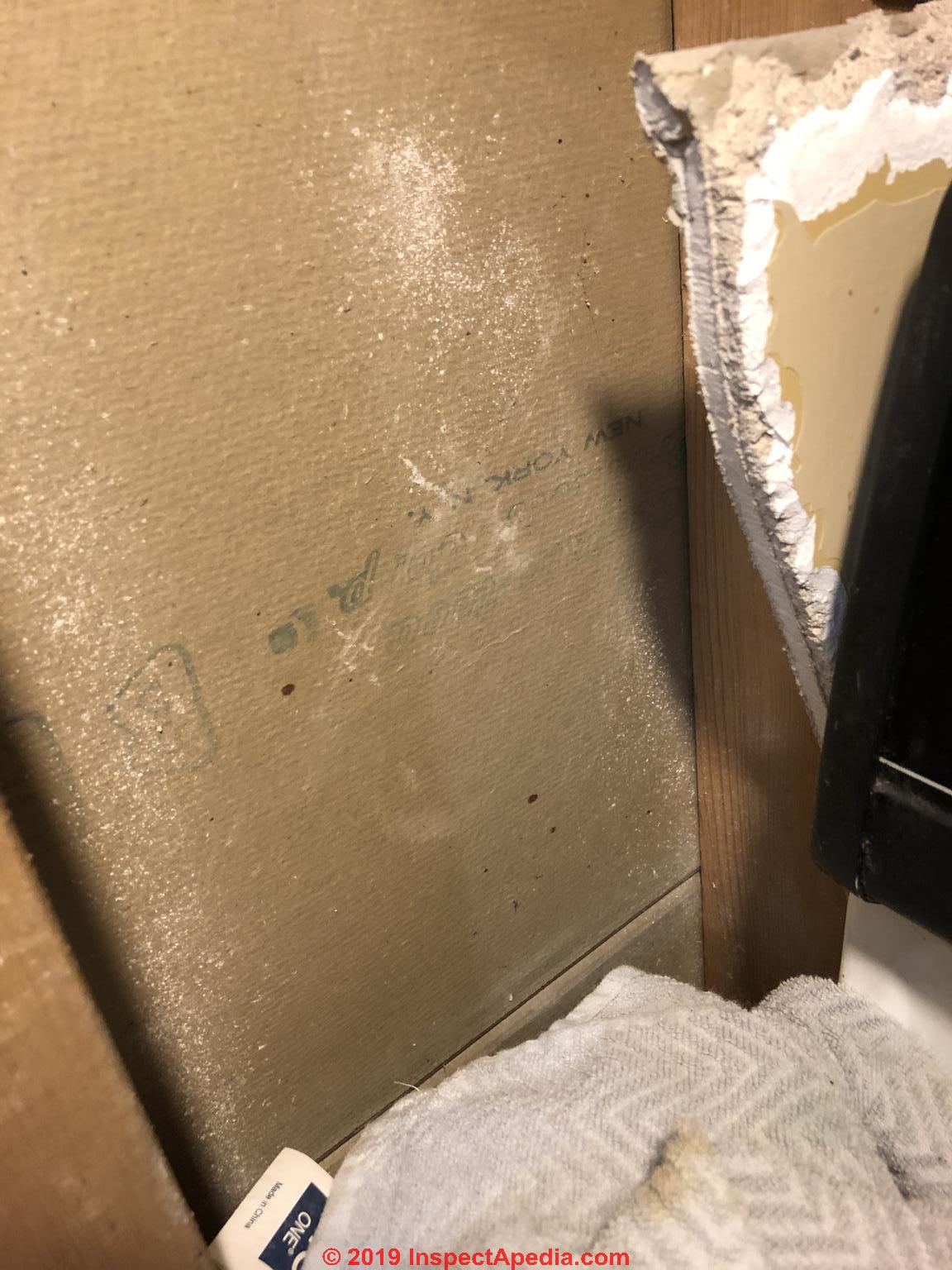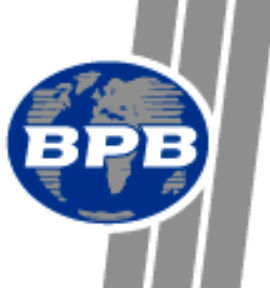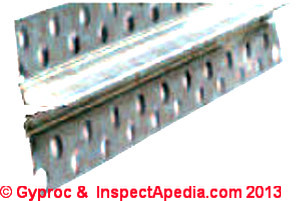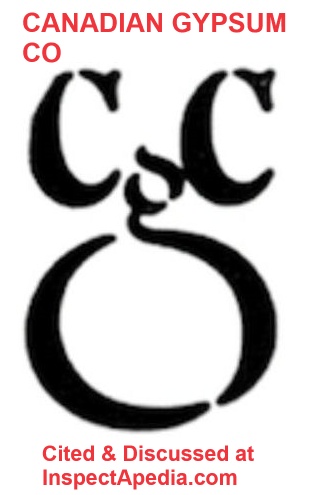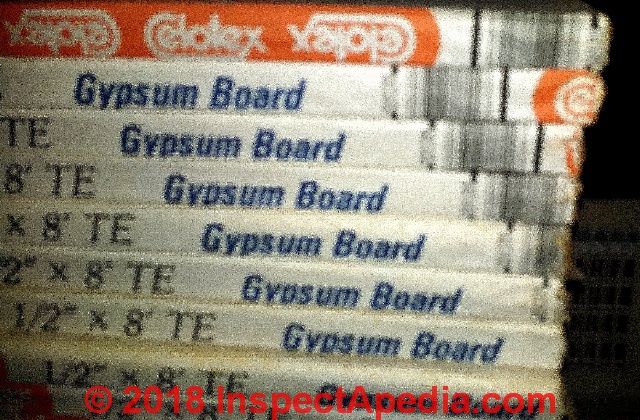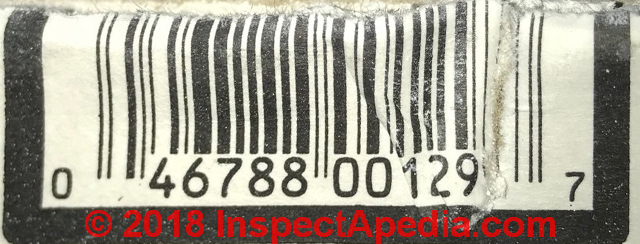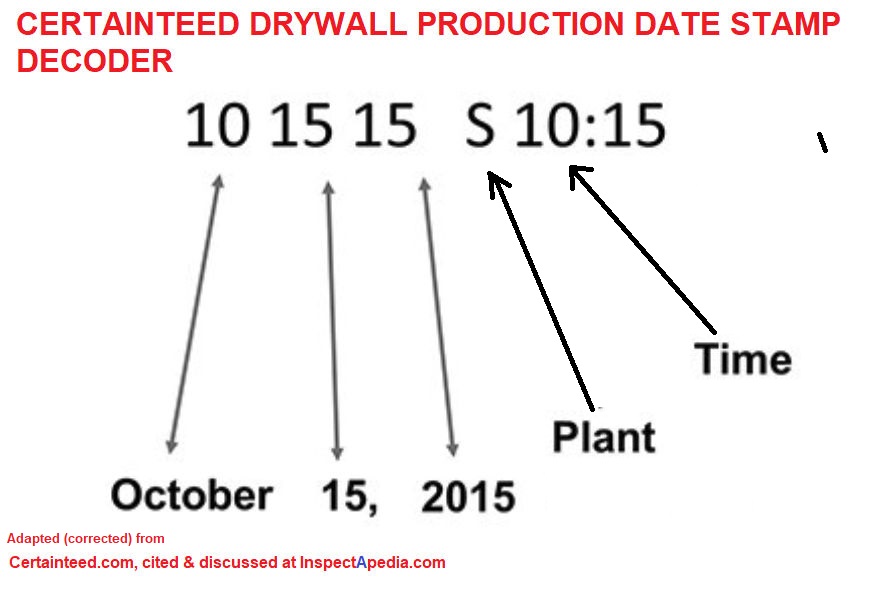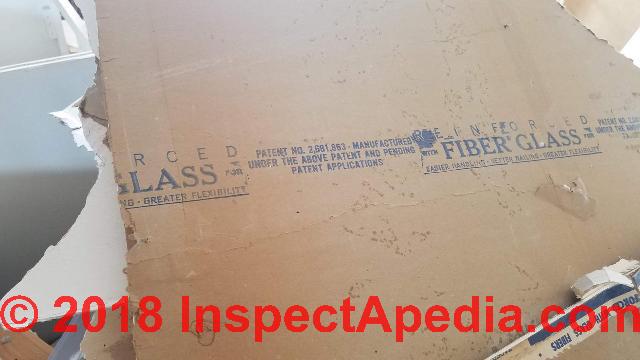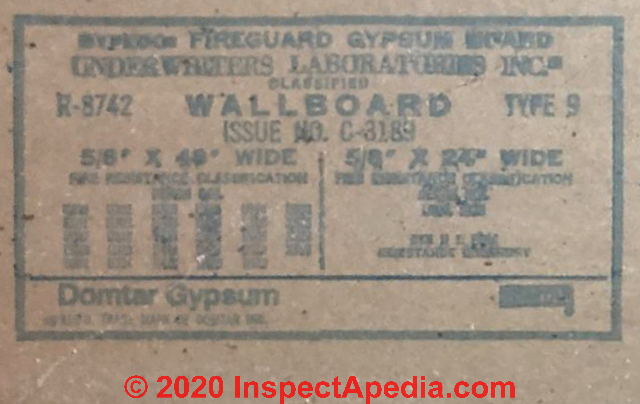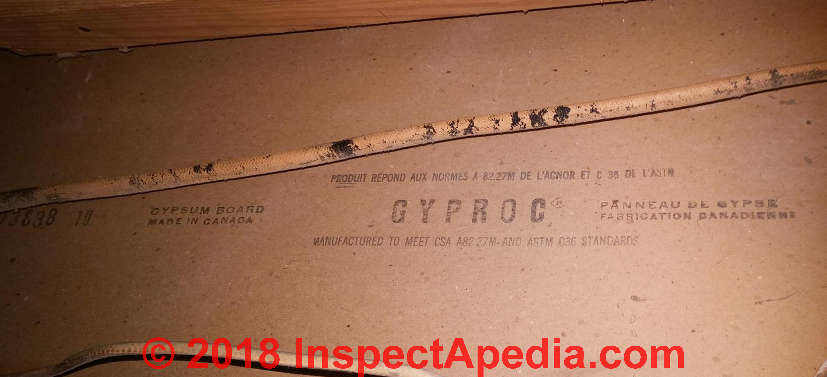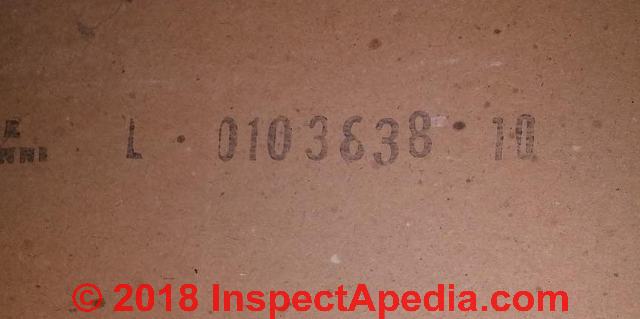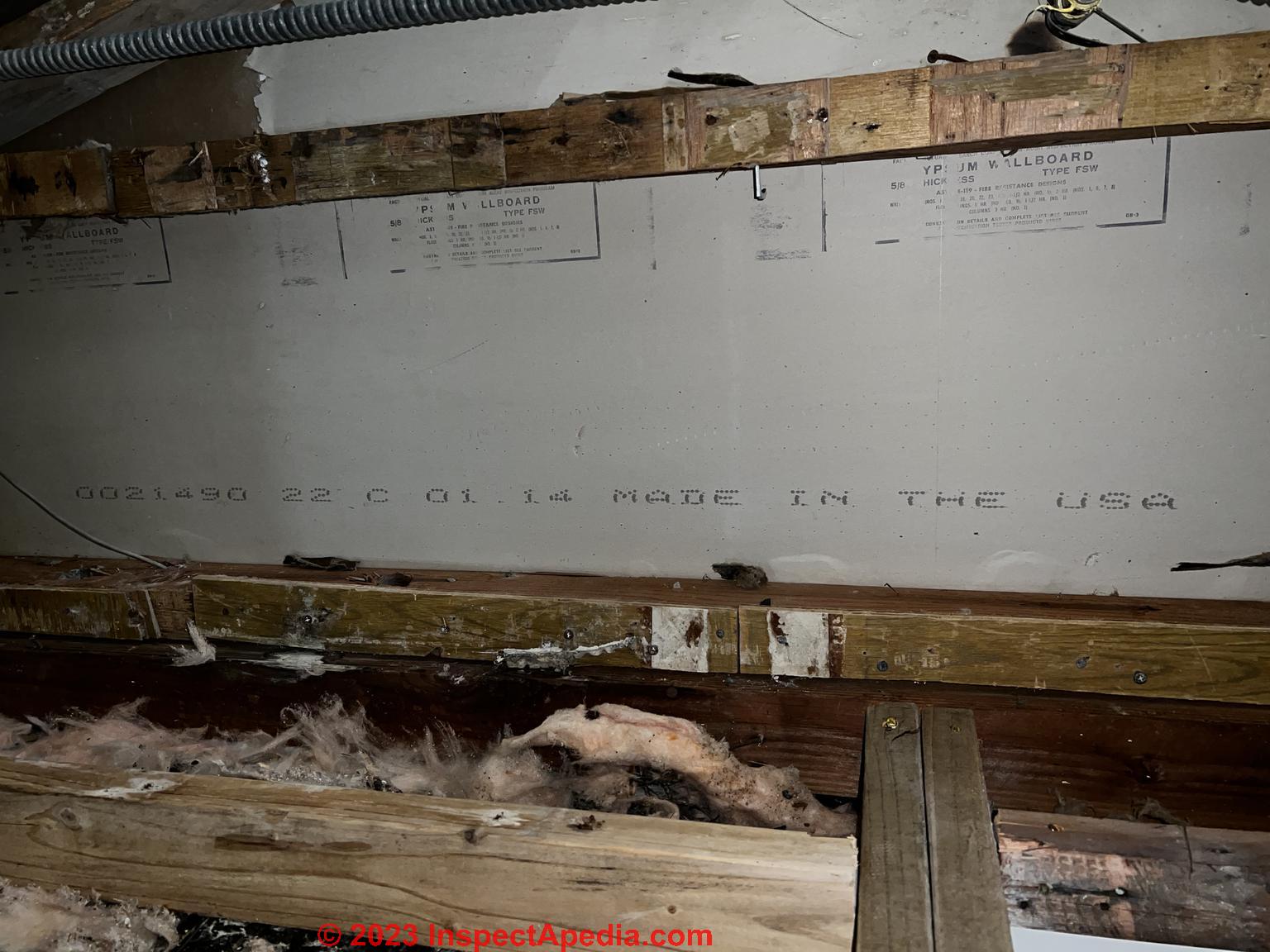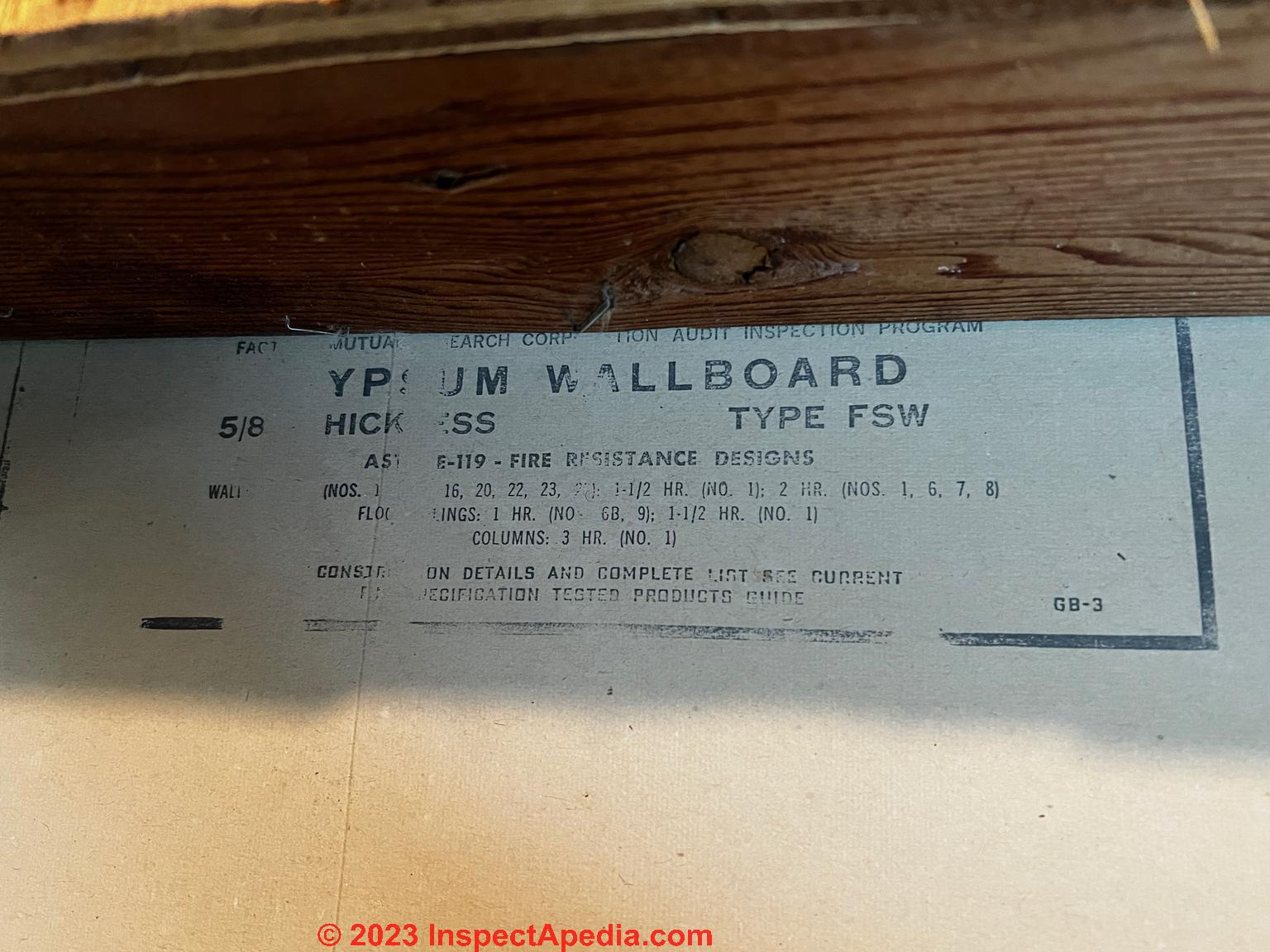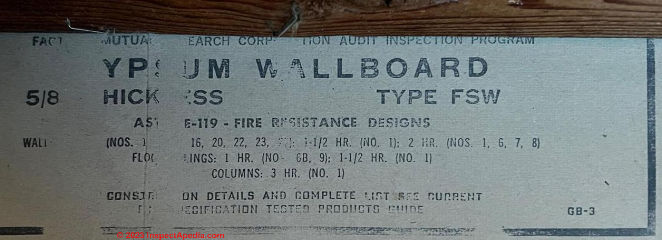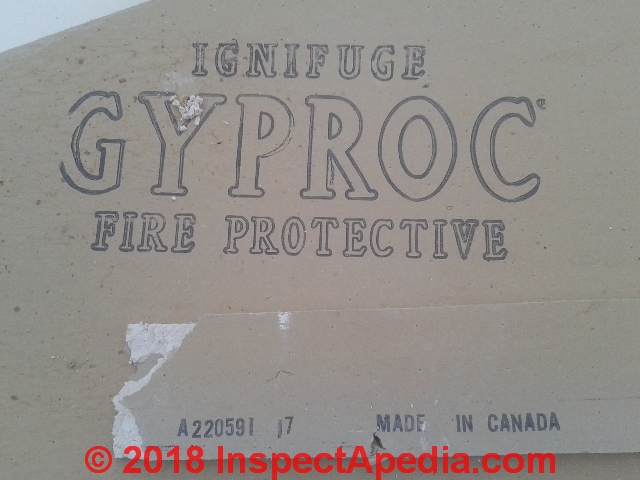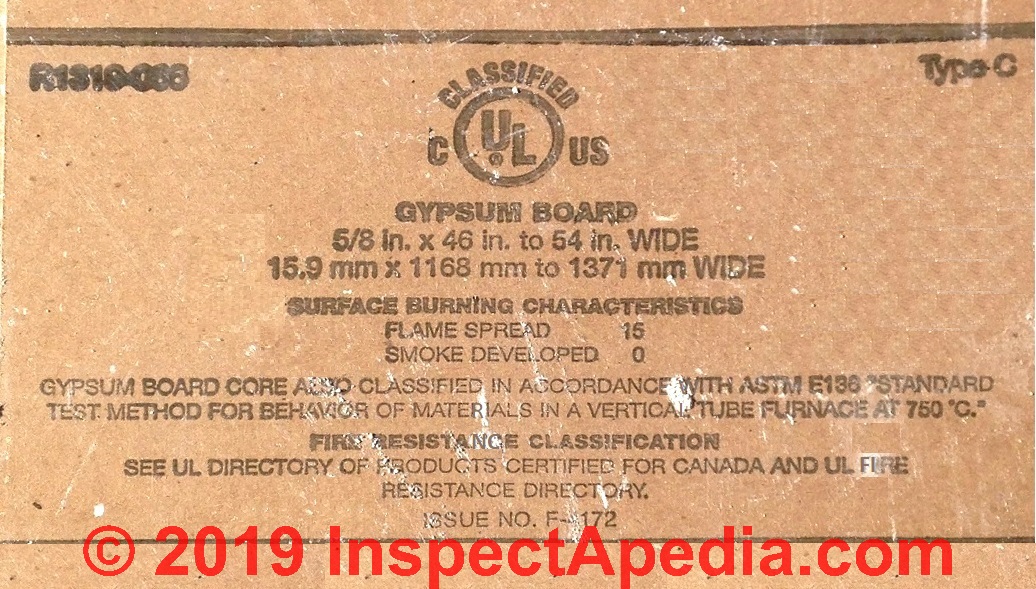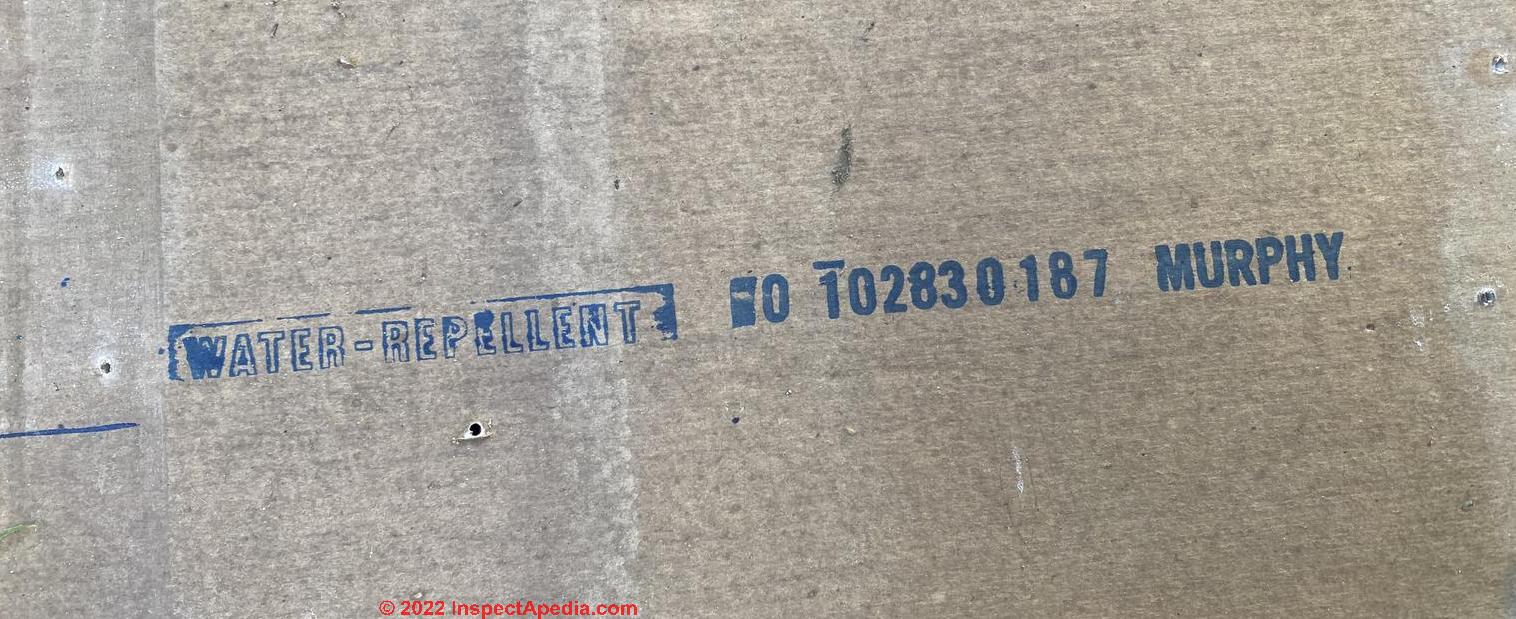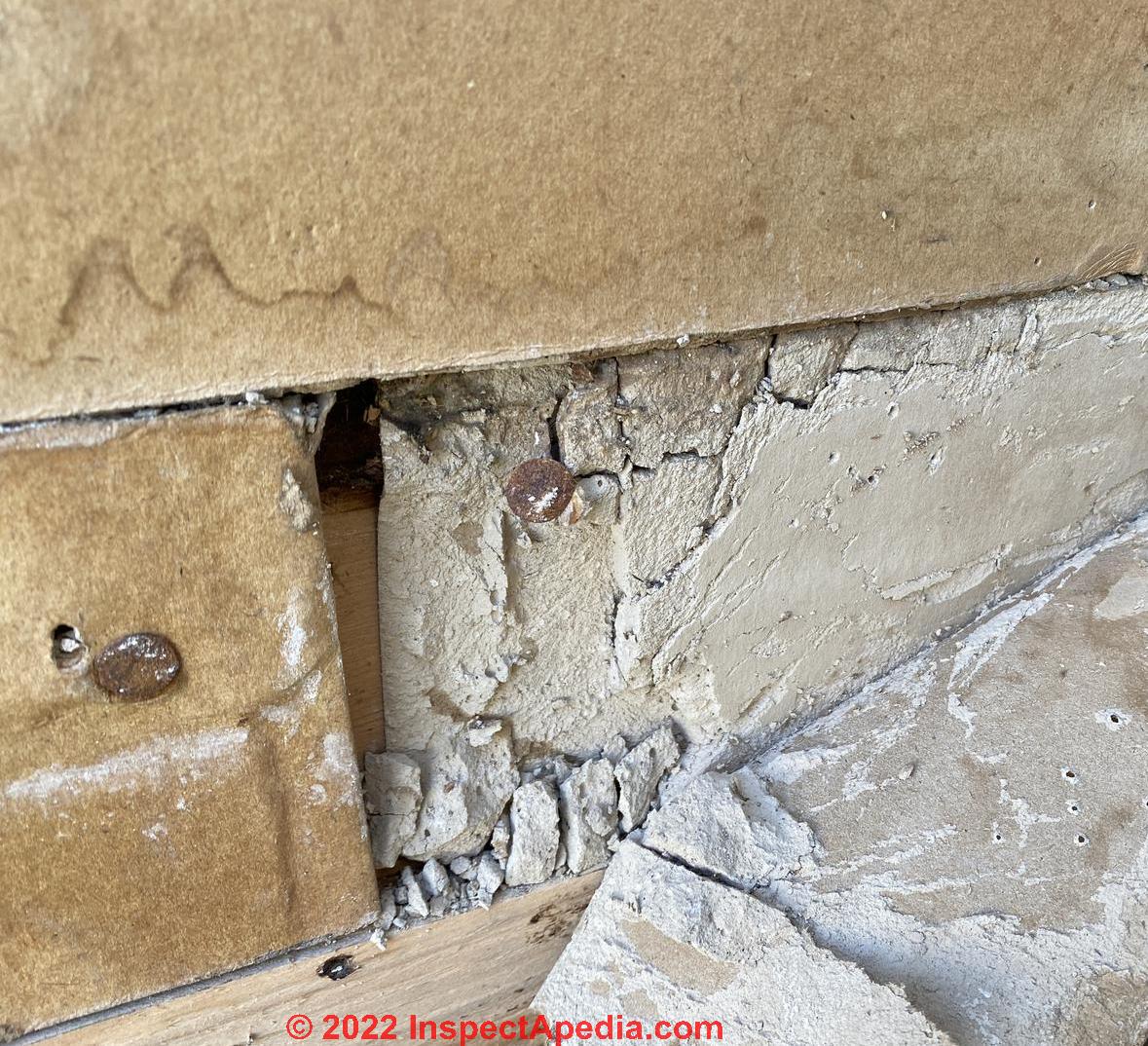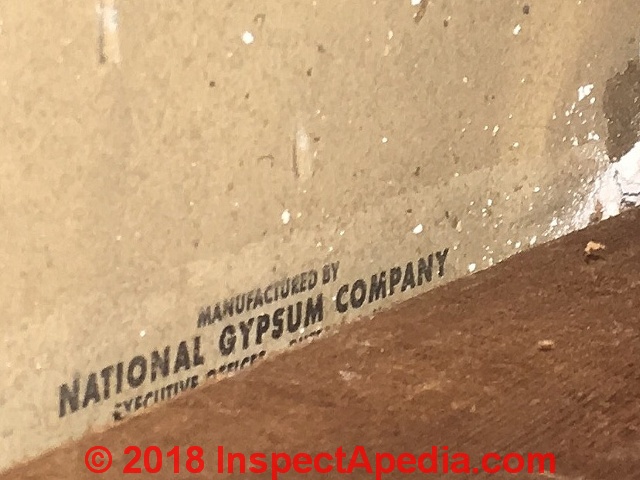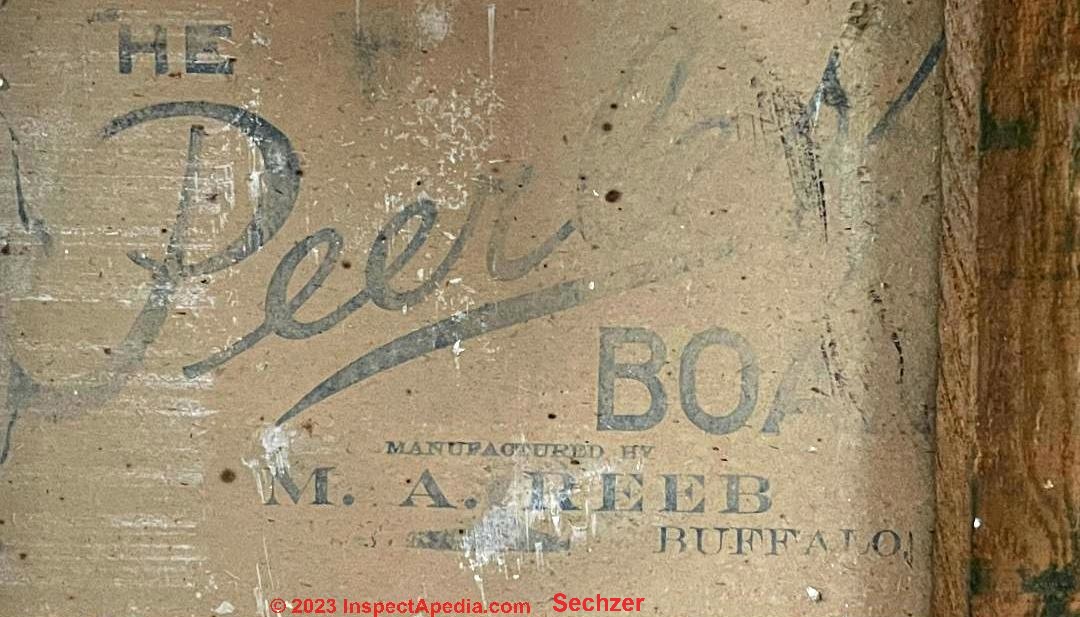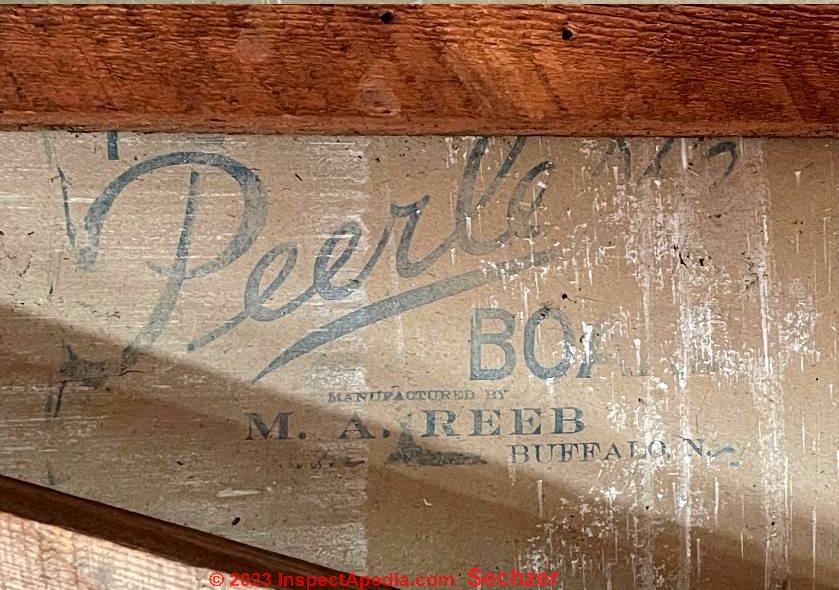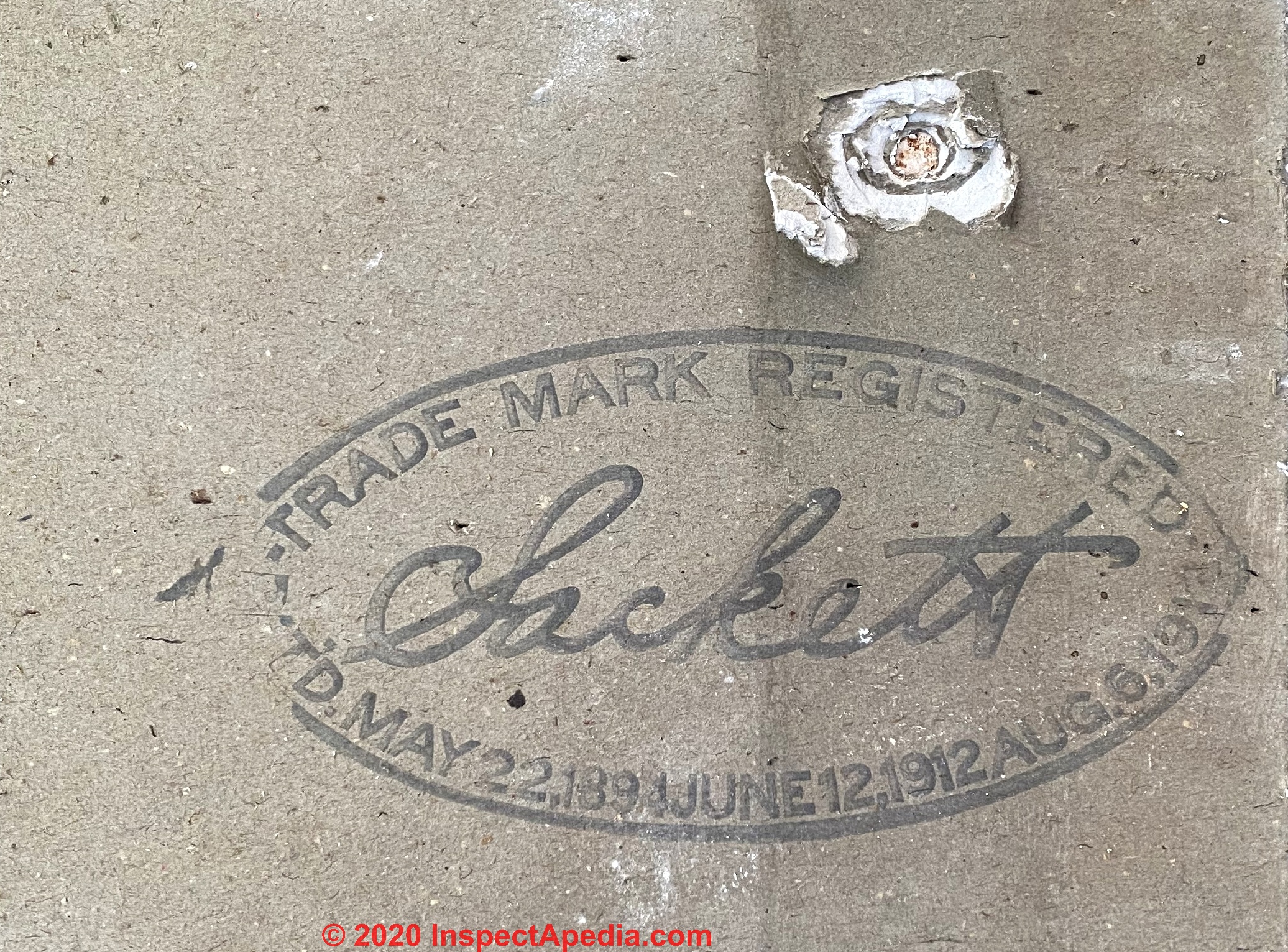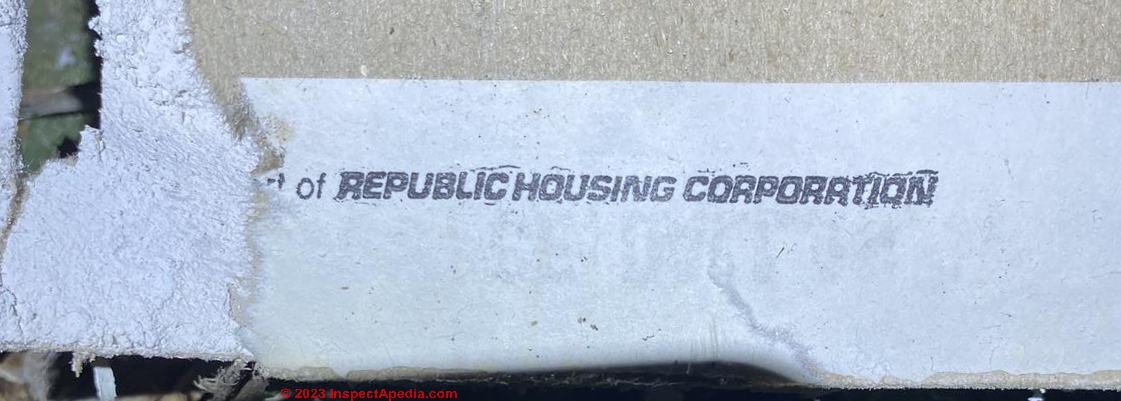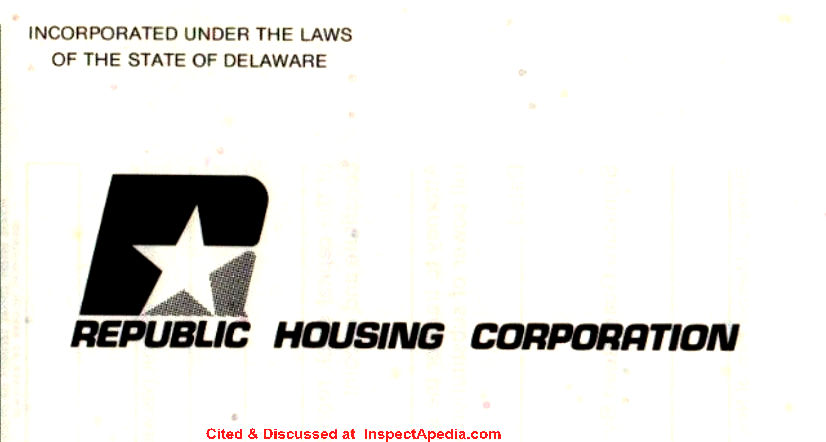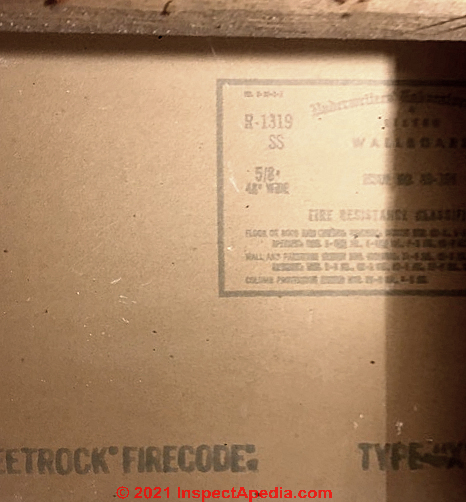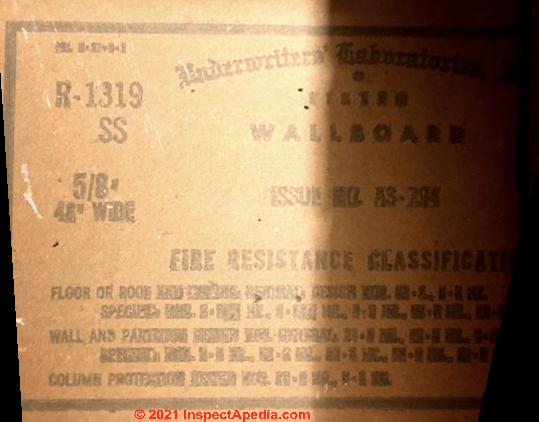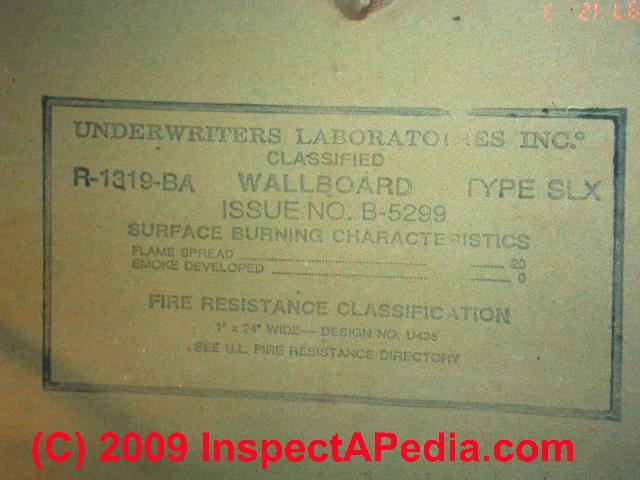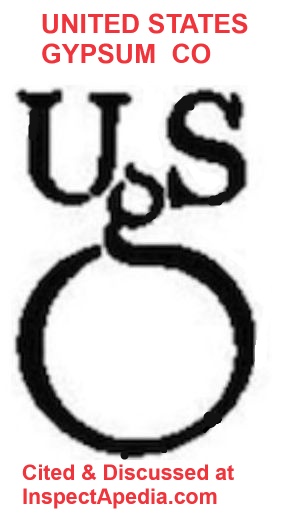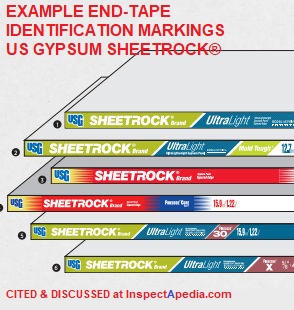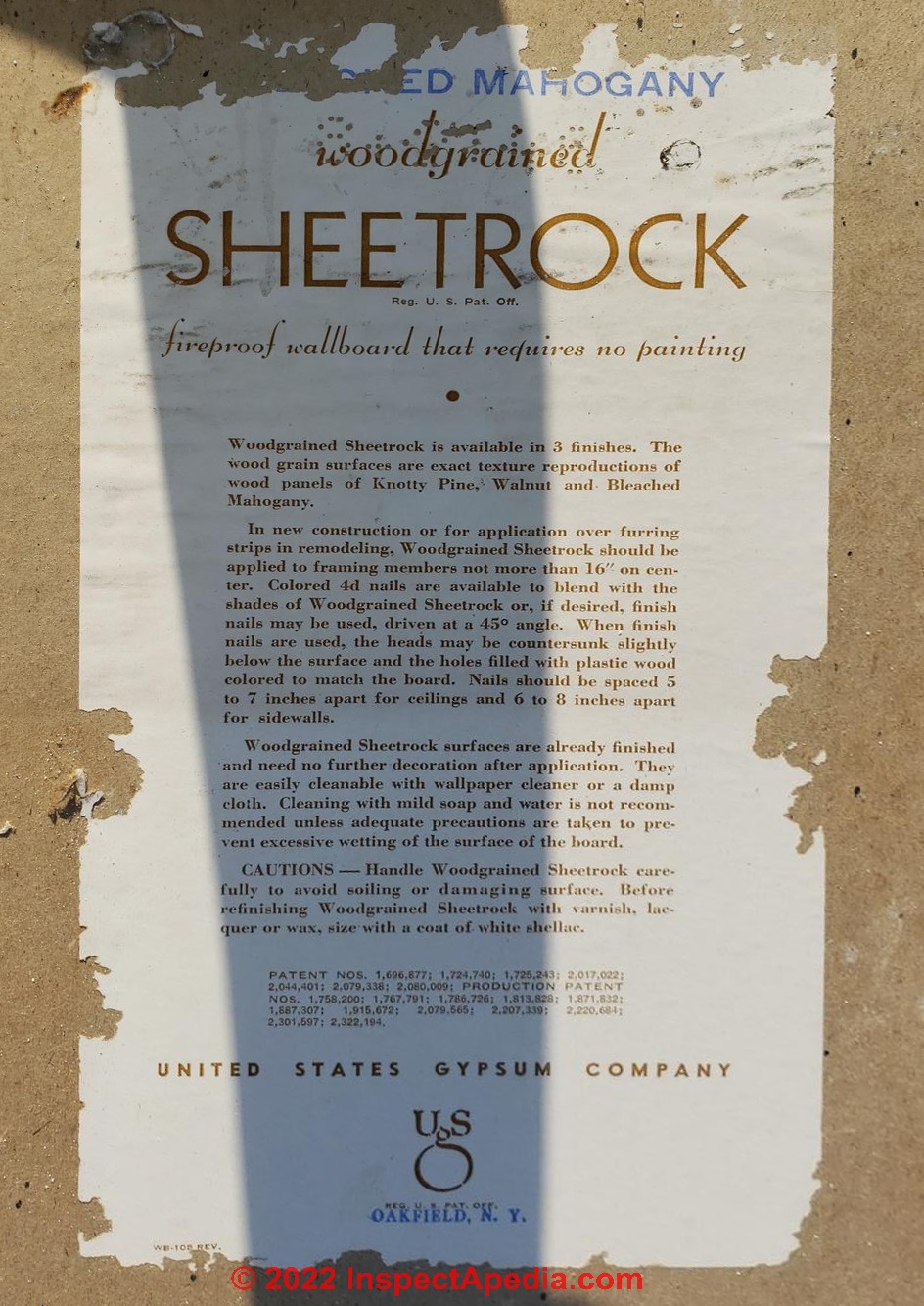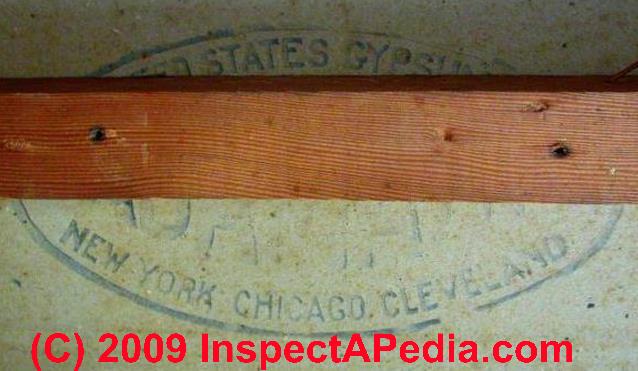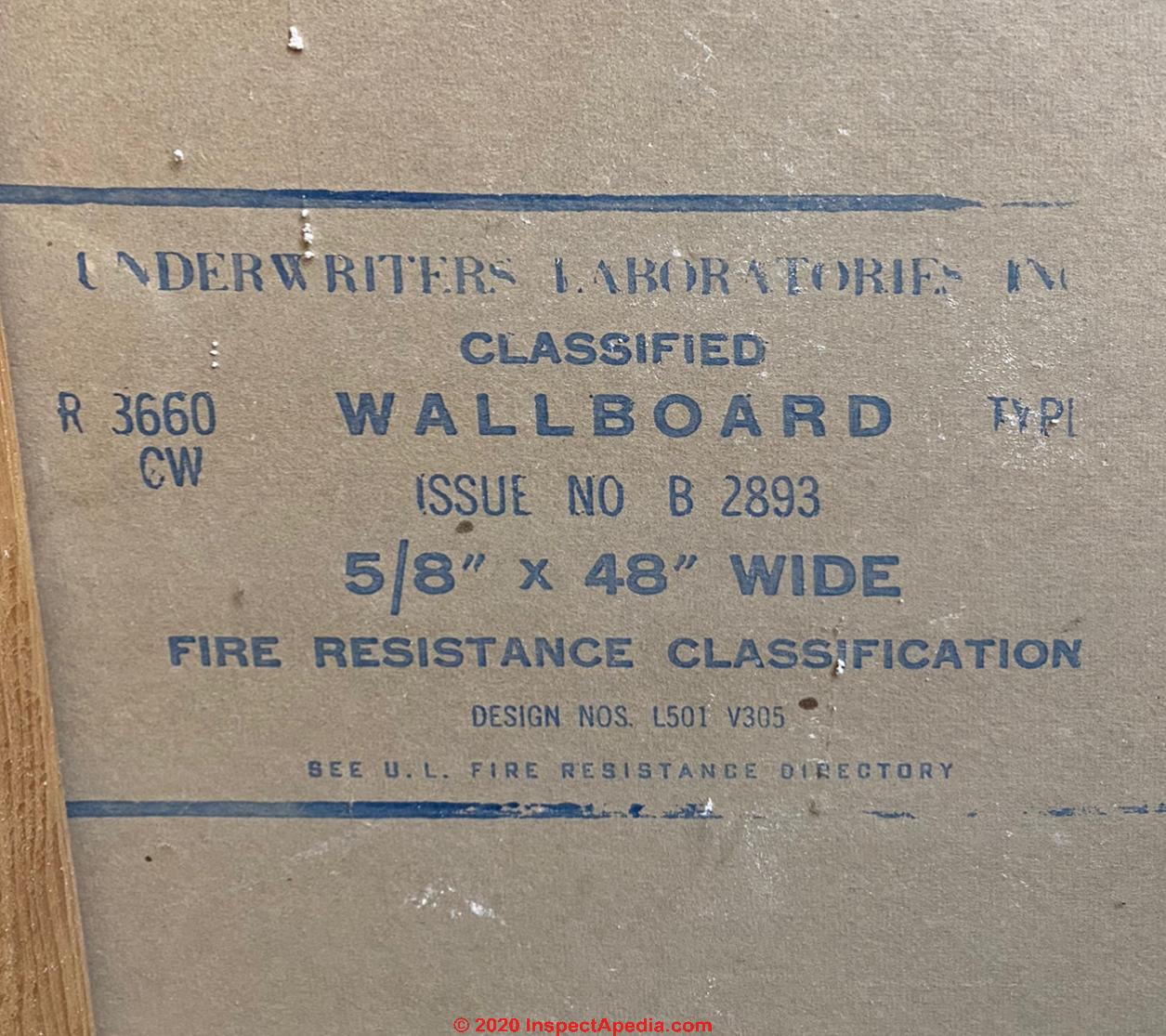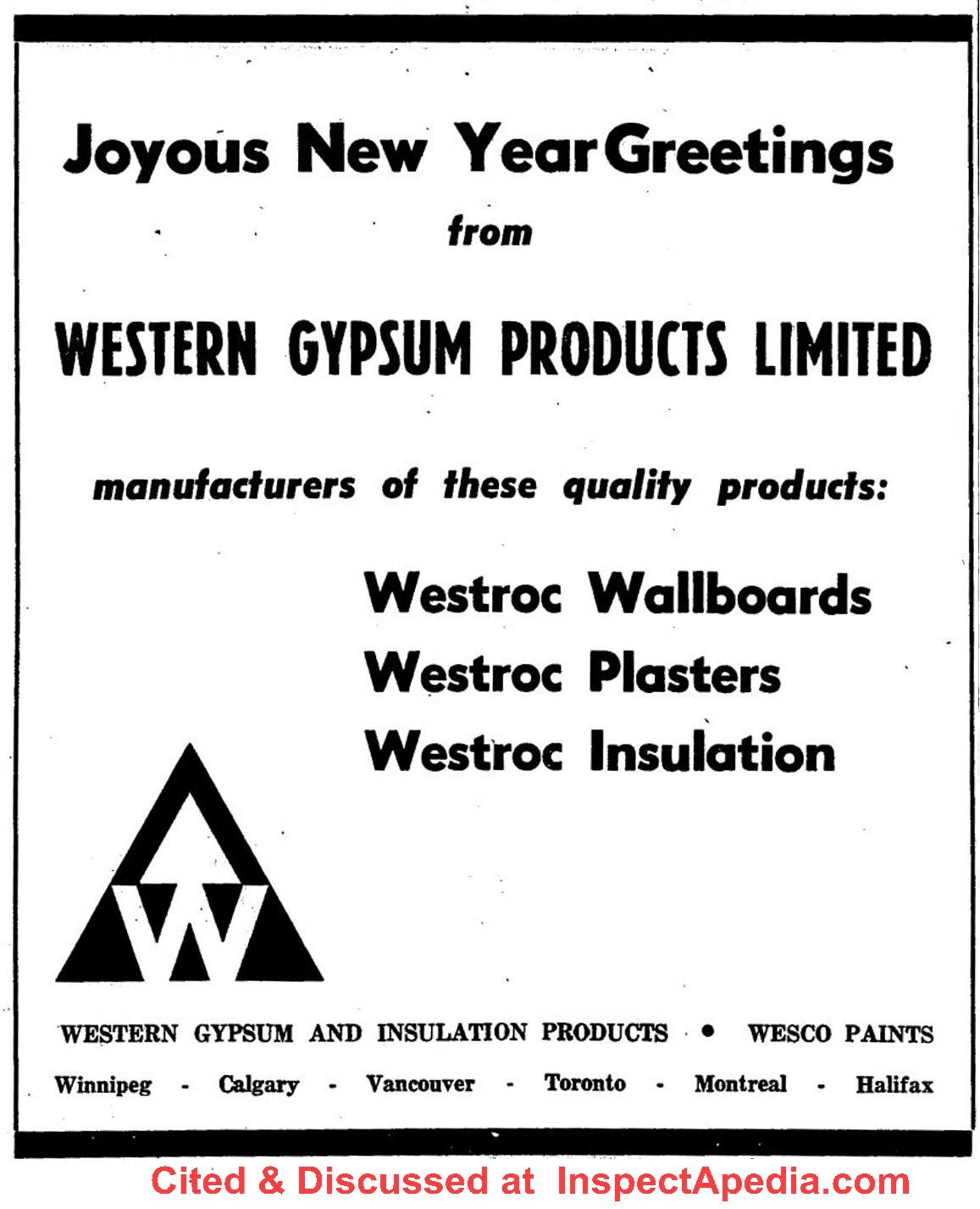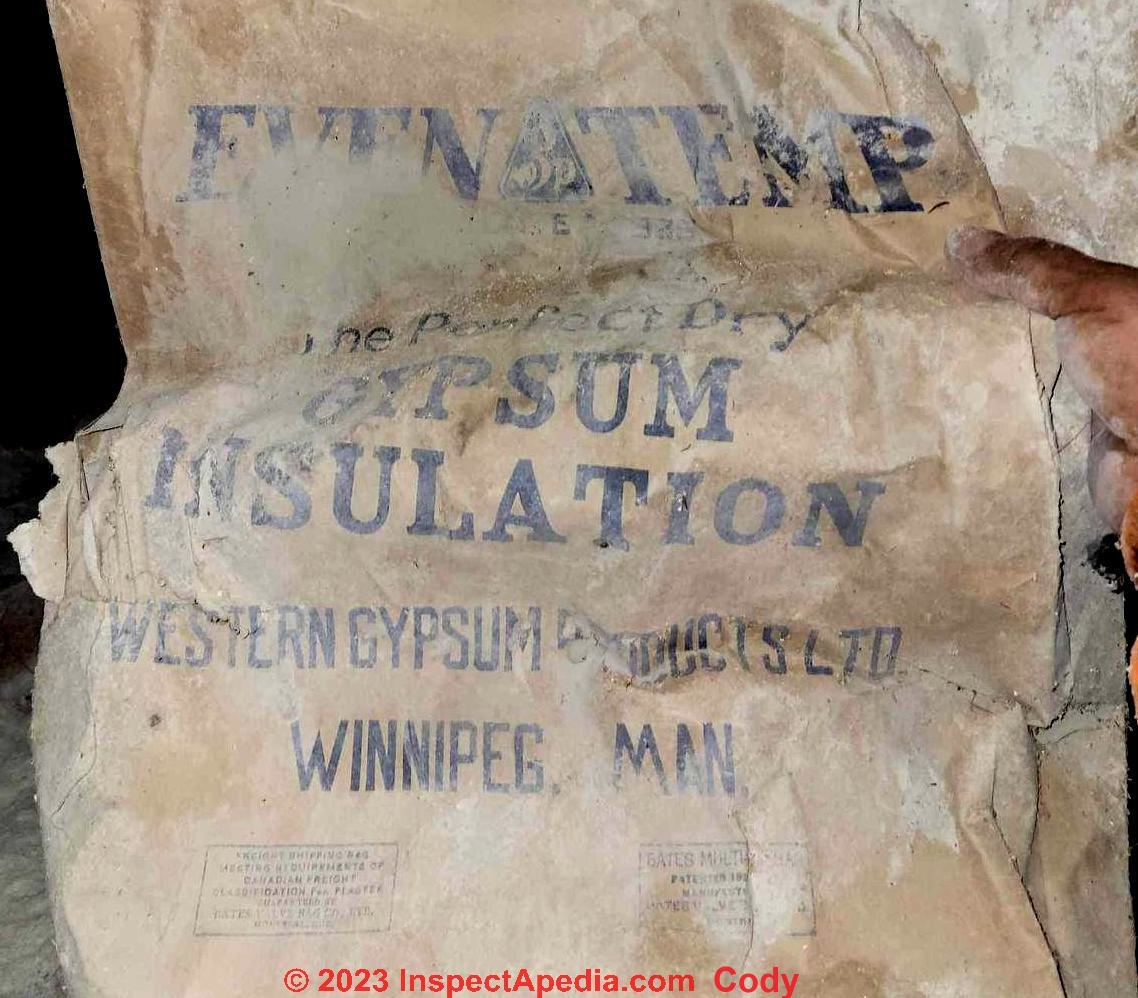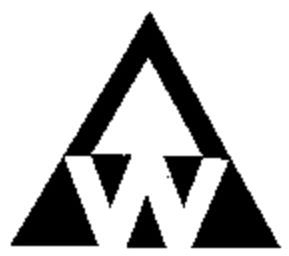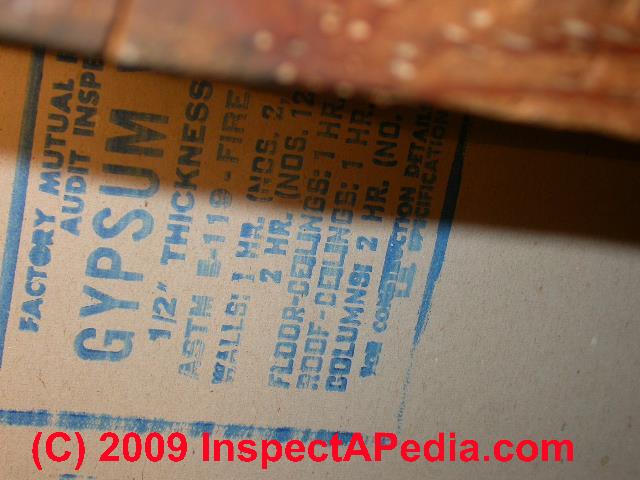 Drywall Manufacturer Identification Stamps & End-Tapes
Drywall Manufacturer Identification Stamps & End-Tapes
List of drywall/gypsum board manufacturers
- POST a QUESTION or COMMENT about drywall, gypsum board, "sheetrock" panels, brands, manufacturers
Guide drywall identification
Here we illustrate identifying stamps, labeling, paper imprints, and other details that can help identify specific drywall or gypsum board products.
These markings can help forming an estimate of building age and also help identify drywall products that might contain asbestos.
This article series discusses the identification and history of both modern and older interior building surface materials such plaster and lath, Beaverboard, and Drywall - materials that were used to form the (usually) non-structural surface of building interior ceilings and walls. Our page top photo shows hand-split wooden lath backing for a plaster interior wall.a
InspectAPedia tolerates no conflicts of interest. We have no relationship with advertisers, products, or services discussed at this website.
- Daniel Friedman, Publisher/Editor/Author - See WHO ARE WE?
Drywall Manufacturers' Identification Stamps & Codes
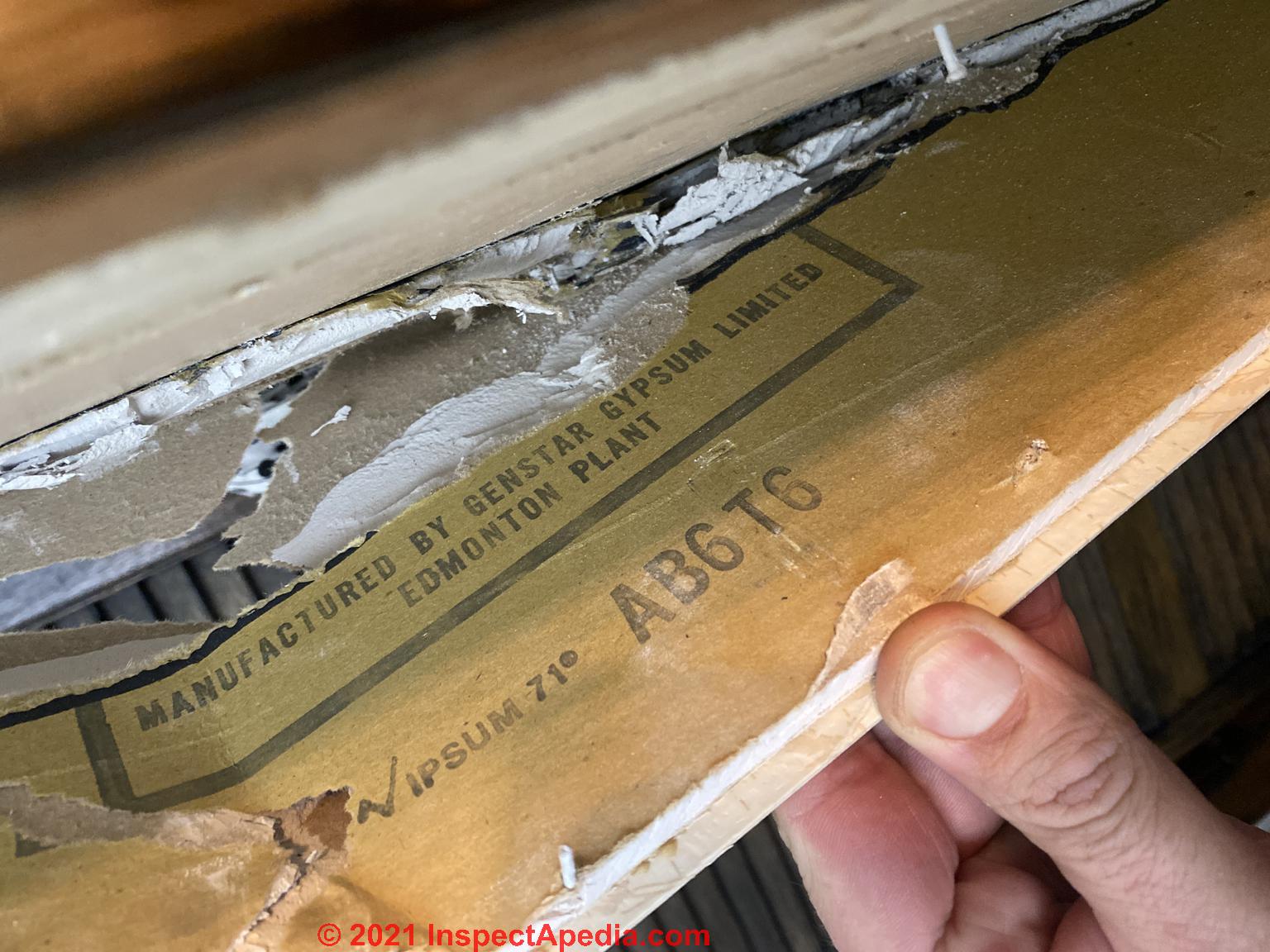 Here is a complete index to individual drywall (gypsum board) manufacturers' identification stamps, end tapes, and other markings that identify brands of drywall or gypsum board, listed alphabetically by manufacturer.
Here is a complete index to individual drywall (gypsum board) manufacturers' identification stamps, end tapes, and other markings that identify brands of drywall or gypsum board, listed alphabetically by manufacturer.
[Click to enlarge any image]
Note: a check at opencorporates.com in June 2023 found 88,206 companies who registered corporate names using the word "Drywall".
Here we list ONLY companies who actually produced drywall or gypsum board or "sheetrock" (a brand of drywall).
Please use the page top or bottom CONTACT link to send us photos of drywall end tapes or identifying stamps from other drywall companies not found in this list.
- Adamant Panel Board - see US GYPSUM DRYWALL IDENTIFICATION STAMPS
- AMERICAN GYPSUM DRYWALL Co.
- BESTWALL DRYWALL IDENTIFICATION
- BPC BRITISH PLASTER BOARD LTD.
- CANADIAN DRYWALL IDENTIFICATION - Alabastine CGC, Canadian Gypsum, Genstar, GLC, Ignifuge, TruRock, Western Gypsum, Westroc and others
- CELOTEX GYPSUM BOARD / DRYWALL
- CERTAINTEED GYPSUM BOARD
- CHINESE DRYWALL IDENTIFICATION & HAZARDS - separate article
- DOMTAR GYPSUM DRYWALL
- EXTERIOR-USE GYPSUM BOARD
- FM FACTORY MUTUAL DRYWALL
- CANADIAN GYPSUM LIME & ALABASTINE GLA DRYWALL ASBESTOS?
- GENSTAR GYPSUM LTD DRYWALL IDENTIFICATION
- GYPSUM BOARD GYP ROCK SHEATHING
- GYPROC DOMTAR CANADIAN GYPSUM BOARD ID
- GYPROC IGNIFUGE FIRE RATED DRYWALL ID
- IGNIFUGE GYPSUM BOARD ASBESTOS?
- MURPHY WALL PRODUCTS DRYWALL
- NATIONAL GYPSUM DRYWALL
- PEERLESS BOARD
- REPUBLIC GYPSUM COMPANY DRYWALL ID
- ROCK LATH GYP LATH PLASTER BASE
- SACKETT BOARD
- SHEETROCK® DRYWALL IDENTIFICATION - Type X Sheetrock
- TruRoc DRYWALL IDENTIFICATION - Canada
- US GYPSUM DRYWALL IDENTIFICATION STAMPS
- WESTERN GYPSUM PRODUCTS LTD.
- WESTROC DRYWALL / GYPSUM BOARD
Drywall Identification Codes & Standards
...
American Gypsum Company Drywall Identification
The Republic Housing Corporation was the parent company of Republic Gypsum incorporated in Delaware. Republic Gypsum Company continued operations to 2003, and some corporations may still be in business. Republic Gypsum did business using the name and brand American Gypsum.
AMERICAN GYPSUM COMPANY (trading name, 2001-06-06 - )
American Gypsum also did business in various states with incorporations under various names including:
AG Dallas LLC, 701 Brazos Ste 1050, Austin, TX, 78701-3232) incorporated in Texas in 2004 - to present
American Gypsum Company
American Gypsum & Wood Products
American Gypsum and Building Supply Inc.
American Gypsum Cement Products
American Gypsum & Steel Products LLC (Arkansas) - 2000 to present
- see also REPUBLIC GYPSUM COMPANY Drywall
...
Bestwall Drywall Identification Stamps
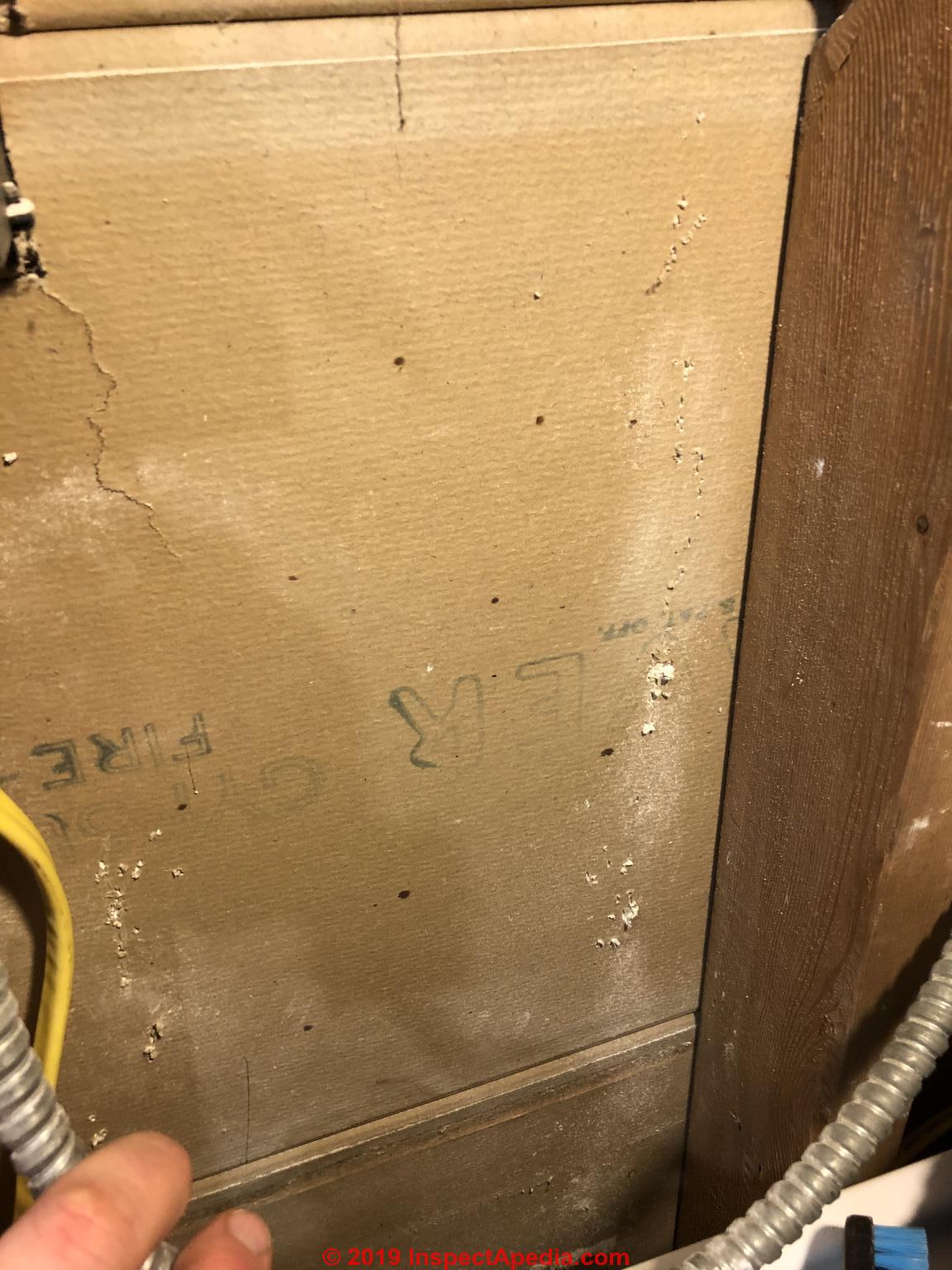 Thanks to reader Nick for these photos giving some hints at identifying Bestwall gypsum board (2020/01)
Thanks to reader Nick for these photos giving some hints at identifying Bestwall gypsum board (2020/01)
Question:
2020/01/16 Nick said:
Recently began to take down some old gypsum and I noticed that it said "Certain-Teed Beaver Gypsum Fireproof. Does anyone know anything about this?
Reply:
We describe Bestwall in both its original composition (wood product and gypsum dating before 1920) - not an asbestos-containing product
and in later production by Certainteed as a fireproof gypsum board that contained asbestos.
See details at BESTWALL DRYWALL ASBESTOS
It would be helpful if you could post a photo of the stamp as well as of the material itself.
Your gypsum board may be quite old - dating probably from the 1950s. Certainteed purchased Beaver Products in 1928.
Certainteed's Bestwall Gypsum board contained asbestos through 1976 or possibly 1977 depending on when the product installed in that year may actually have been manufactured. You should also consider that joint compound used with the product may also have contained asbestos.
Reader follow-up:
Here are some photos.
Reader Follow-up:
The text I can read is "“Certain-Teed Beaver Gypsum Fireproof”
Below, US Patent Numbers give an age range, the assignee (U.S. Gypsum) for this gypsum board, and can be searched for the use of "asbestos" (it does not appear). These patents are listed with more detail
...
British Plaster Board Ltd. BPB
BPB is described as the world's largest manufacturer of plasterboard and of gypsum plasters with operations in more than fifty countrys around the world.
- Contact: BPB plc, Park House, 15 Bath Road, Slough, United Kingdom Tel: + 44 01753 898800
Web: http://www.bpb.com
Web (BritishGypsum Saint-Gobain): british-gypsum.com/customer-services/services
Customer Services: 0800 225 225.
Technical Support: 0115 9456 123
British Gypsum Customer Services email - bgcustomerservice@saint-gobain.com
British Gypsum: Plasterboard recycling email - bgrecyclingservice@saint-gobain.com
Currently (since 2005) BPB is owned by Saint Gobain.
History of BPB or British Plaster Board Ltd.
The following succinct recap of the history of BPC is courtesy of businesshistory.com - retrieved 2023/11/27
- 1915 - The British Plaster Board Ltd. founded
- 1917 - incorporated as private company
- 1932 - British Plaster Board Ltd. went public
- 1953 - British Plasterboard acquired C Davidson & Sons Limited (owned Abertay Paper Sacks), became one of largest producers in world of paper bags;
- 1954 - British Plaster Board acquired Westroc Industries Limited, major move into Canadian, North American markets;
- 1965 - British Plaster Board name of parent company changed to BPB Industries Ltd.;
- 1968 - BPB acquired British Gypsum Limited, became market leader in building, industrial products;
- 1987 - BPB acquired Rigips brand (major international expansion in Germany, Austria, Italy and the Netherlands), became one of leaders in building plasters, specialist and industrial plasters, plasterboard liner, packaging boards;
- 2000 - BPB became number one in Europe for EPS Insulation material;
- 2005 - BPB was acquired by Saint-Gobain, in Saint-Gobain's Construction Products Sector.
References for BPB
- British Gypsum Co., "Gyproc Control Joint, Products Plasterboard Accessories", Website: www.british-gypsum.com.
- British Gypsum (in the U.K.) Gyprock Control Joint, www.british-gypsum.com. The Gyproc control joint is a pre-formed galvanised metal strip 47mm wide x 2048mm long used to form joints in drywall systems to accommodate expansion or contraction up to 7 mm, illustrated at above right.
- GYPROC FIRELINE Product Data Sheet, [PDF] Used in British Gypsum partition, wall lining and ceiling systems to give increased fire protection.
Also used for protection to structural steel. British Gypsum, Tel: 0844 800 1991, Website: www.british-gypsum.com email: bgtechnical.enquirires@bpb.com - GYPROC FireLine® Saint-Gobain product information [PDF] (2014) op. cit.
...
Canadian Drywall Identification Stamps
Canadian drywall products are described in this article series. Some but not all of these Canadian drywall products included use of asbestos.
- ASBESTOS in CANADIAN CGC DRYWALL? - USG-Canada Drywall & Rock Lath gypsum board
- ASBESTOS in CANADIAN GYPSUM COMPANY LIMITED FIREPROOF Gypsum Board
- ASBESTOS in CANADIAN DOMTAR GYPROC DRYWALL?
- ASBESTOS in CANADIAN GYPSUM LIME & ALABASTINE GLA DRYWALL - GYPROC
- ASBESTOS HAZARDS in CANADIAN TruRoc DRYWALL - RESEARCH
- ASBESTOS HAZARD RISK ASSESSMENT for CANADIAN DRYWALL
- ASBESTOS HAZARDS in CANADIAN DRYWALL - RESEARCH
- GENSTAR GYPSUM LTD ASBESTOS?
- IGNIFUGE GYPSUM BOARD ASBESTOS?
- WESTERN GYPSUM PRODUCTS LTD.
- WESTROC DRYWALL / GYPSUM BOARD and also - see GENSTAR
See details about asbestos in Canadian gypsum board or drywall products
at CANADIAN DRYWALL ASBESTOS - where we further identify Canadian drywall manufacturers such as CGC, Domtar Gyproc, GLC, GLA, & TruRoc
...
Celotex Drywall Identification Labeling
Above and below: Celotex® Fiberglass-reinforced drywall identification labels & UPC
Our photos show modern as well as antique identification stamps or labels that may be found drywall products used for interior walls and ceilings.
[Click to enlarge any image]
Also see
Contact Celotex:
- Celotex, Lady Lane Industrial Estate, Hadleigh, Ipswich, Suffolk, IP7 6BA UK Tel: 01473 822093
Celotex UK produces Roofing, Flooring, and Wall insulation products - Celotex Asbestos Settlement Trust: http://www.celotextrust.com/ , On October 12, 1990, Celotex Corporation and Carey Canada Incorporated filed for reorganization under Chapter 11 of the U.S. Bankruptcy Code. Celotex Asbestos Settlement Trust. P.O. Box 1036. Wilmington, Delaware 19899-1036
...
CertainTeed Drywall Identification & Product Stamp Decoder
Current CertainTeed drywall includes a date stamp that can be decoded to also show the manufacturing plant.
Above: courtesy of CertainTeed Corp., retrieved 2021/08/26, adapted with minor edits from original source:
- HOW DO I IDENTIFY THE BOARD I AM USING? (HOW CAN I TELL WHO THE MANUFACTURER IS AND WHEN IT WAS MADE?) (2016) Saint-Gobain, Certainteed Corporation, Tel: 800-233-8990, Website: www.certainteed.com, retrieved 2022/05/05 original source: www.certainteed.com/drywall/how-do-i-identify-board-i-am-using-how-can-i-tell-who-manufacturer-and-when-it-was-made/
Other Certainteed drywall manufacture date stamps may be explicit and may appear on the back of the drywall as this example:
CERTAINTEED 15/09/22 V 22.22
Made in CAN ASTM C1396 CDN/USA A82.27
CertainTeed Drywall Stamp (1951)
Above, fiberglass-reinforced drywall, probably a CertainTeed® product, as the patent number assigned this product design to that company. This product used fiberglass as a reinforcement and it probably does not contain asbestos.
Details about this particular drywall, described in
the CROCE DRYWALL PATENT No. 2,681,863 [PDF] (1951), are given
at ASBESTOS in DRYWALL [web article].
Below is a photo of Certain-teed Products Corporation's Beaver Gypsum Lath, "Fire-Proof" "rock lath" courtesy of InspectApedia.com reader Z Headman & Zach, posted originally as a comment at the bottom of this page.
More photos of CertainTeed gypsum board and Certain-Teed or Beaver drywall identification stamps and photos are at
CERTAINTEED DRYWALL ASBESTOS [web article].
What CertainTeed currently says about how to identify Type X Drywall
Both regular and Type X gypsum board are covered under the ASTM C 1396, gypsum board standard specification.
Regular drywall has naturally occurring fire resistance due to the presence of gypsum in the core but is not fire rated. Type X drywall has special core additives that allow it to be used in fire rated designs and usually comes in 5/8” thickness.
Type X drywall products will have a UL/ULC Marking printed on the back of each board identifying it as a fire-resistance rated board. - Certainteed, retrieved 2021/07/17 original source: https://www.certainteed.com/drywall/what-difference-between-regular-and-type-x-gypsum-board/
and
Fire rated gypsum drywall is more fire resistant because it contains glass fiber reinforcement and other additives within its specially formulated gypsum core to help it hold up longer to a fire exposure.
Fire rated drywall is referred to as “Type X” and must be third-party certified by an independent testing and listing agency such as UL (Underwriters Laboratories Inc.) and ULC (Underwriters’ Laboratories of Canada) to meet the fire performance requirements prescribed in the ASTM C1396 (CAN/CSA-A82.27) Standard Specification for Gypsum Board. - 2021/07/17 Certainteed, https://www.certainteed.com/drywall/what-fire-rated-gypsum/
...
Domtar Gyproc Drywall Identification
Question: does this Domtar wallboard contain asbestos?
2020/01/03 Tyler Garneau said:
Domtar 92050600:0246 Rippon
Wall board type 9
Issue number c-3189
Wondering the age and if contains Asbestos
Reply: Gyproc Domtar FIREGUARD GYPSUM BOARD Type 9 Wallboard
As this is Domtar Fireguard it may contain asbestos.
See details at
Canadian Gyproc in a 1949 home
1949 home. Concerned this drywall and/or mud May have asbestos.
Previous owners said they did 3 renovations on the basement- in the mid 80s then mid 90s, then mid 2000s. Can the age of this drywall be identified by the printing on it?
On 2018-09-05 by Ivan Garcia
Comments by (mod) - identifying Gyproc made in Canada
Thank you for an interesting and useful question, Ivan.
Indeed some Gyproc, particularly Ignifuge Fire Resistant Gyproc may contain asbestos. But yours may be an entirely different product.
It might be that the production number, partly visible in the right end of your photo as it appears, is a production run number that in turn might be able to be decoded to a date, but I have not yet found an age decoder for Gyproc stamps and I'm doubtful.
When faced with the "how old is it" question for building materials, and when there is not a clear date stamp or code, I look for external clues of the age of the material, in this case the age of your Gyproc including
Age of the building - that sets a floor under the probable age of its materials of construction
Age of surrounding materials, particularly those that are likely to have been put in place at the same time
Dates of renovation work, modifications, repairs: in your case mid 80s then mid 90s, then mid 2000s.
Location of the building: country and city, since when addressing your asbestos question we know, for many countries, about when asbestos use in drywall and drywall mud (joint compound) ceased.
In your photo the fabric-covered electrical wire is likely from original construction. The wooden stud looks newer than 1949 as it is so light in color, but I see what looks like paint or something in the lower right corner of the photo that may be older material.
If the Gyproc in your photo was part of the basement renovation work then you have an "oldest" date of 1985. For North America that's likely to be post-asbestos.
See these two articles
IGNIFUGE GYPSUM BOARD ASBESTOS?
by Ivan Garcia
Wow-
Thanks for the prompt and thorough reply. Great info.
Country is Canada- province Manitoba, city Winnipeg.
I will get a better shot of the number stamped at the right end of the photo. Thank you for looking into an age decoder for Gyproc Stamps.
Regards,
Ivan
Production Code No. L 0103638 10 on Canadian-made Gyproc with Blue Domtar logo
Here is a picture of the production code number. Do you think a decoder could be found for it?
Regards.
Ps, I found that on some of these sheets, there is a blue Domtar logo on the edge.
Thanks again.
Ivan
Do you think there's a chance that decoder could be out there?
I haven't been able to find one.
On 2018-09-24 by (mod) - trying to decode the stamps on Canadian Gyproc or Blue Domtar Logo Gypsum Board
IMO it seems likely that the company would have known what their number-stamps meant; but if a company is no longer around it can be difficult to find that documentation unless you find it in a legal proceeding, litigation, or on occasion, a patent disclosure.
The above Q&A were posted originally
...
Factory Mutual & FM Drywall Stamps
[Click to enlarge any image]
Above: Factory Mutual Audit Inspection Stamp on 1/2" gypsum wallboard that is 1-hour factory rated.
Below: FM Gypsum brand wallboard, type FSW giving fire ratings.
Contact FM Approvals: Website: https://www.fmapprovals.com, Worldwide office locations website: https://www.fmapprovals.com/office-locator
Website Excerpt:
FM Approvals continues to test and certify key products related to property loss prevention.
Our dedication to innovation over the years has resulted in numerous technical advancements, including low smoke generation wall panels, clean room materials, suppression mode sprinkler protection and water mist systems.
Above and below, from a 1950's or 1960's home renovated in the 1990's in the U.S. we have reader-contributed photos of drywall stamps including the text
Factory Mutual Research Corporation Audit Inspection Program along with GB-3 that the reader thought might refer to Gold Bod - 3 Drywall.
...
Genstar Gypsum Limited (Canada) Drywall Identification Stamps
Question: does Canadian Genstar Gypsum Ltd. wallboard AB6T6 contain asbestos?
Can anyone tell me if this wallboard contains asbestos before I start tearing it apart more?
Genstar Gypsum Ltd. Edmonton Alberta Genstar- AB6T6 - (Jan 4, 2021) Jamie V said:
Moderator reply:
Jamie
Thank you for the question and photo of Genstar Gypsum Ltd. drywall. .
Genstar produced, among other products, a Type X Gypsum Board that was referred-to in
this CANADIAN STANDARDS DIRECTOR'S INTERPRETATION for TYPE X GYPSUM BOARD 1991 [PDF]
as having a "Fire Performance Rating". Type X wallboard was described in Canadian Standard CSA A82.27-M1977, "Gypsum Board Products". This document includes among its listed products, Genstar Gypsum Limited - Type TRF-3 wallboard.
Nothing in the document we cite here refers explicitly to the use of asbestos in the wallboard's composition, nor was asbestos explicitly excluded.
Watch out: However Genstar is indeed included among companies listed in litigation concerning asbestos in drywall products and drywall mud along with a number of asbestos suppliers.
See ABENDROTH V. HAMILTON MATERIALS, INC., A CALIFORNIA CORPORATION, RESPONDENT [PDF]
Except:
The trial court granted summary judgment in favor of defendant, concluding that there was no genuine issue of material fact as to whether plaintiff was exposed to any asbestos-containing product manufactured by defendant. ...
The subject of the motion for summary judgment in this case was whether plaintiff was ever exposed to an asbestos-containing product that was manufactured by defendant....At issue here is whether any of the “mud” used by plaintiff and manufactured by defendant contained asbestos.
During the relevant time period, defendant manufactured both taping compounds and finishing compounds, which were designed to be used in conjunction with each other. Defendant admits that many of its taping compounds during the relevant time period contained asbestos.
Although all of defendant's taping compounds contained asbestos between 1959 and 1974, its “topping compound,” also known as “finishing compound,” did not. Defendant's finishing compound was its best-selling product.
Watch out: Therefore, until we find other composition data for Genstar gypsum board, It would be reasonable to treat Genstar Gypsum drywall as well as drywall compound used in wall assemblies using this product as presumed to contain asbestos, or if you face a significant demolition cost, to have a sample tested for asbestos.
Genstar Gypsum Limited was a Canadian company operating at least in the 1970s if not earlier, and reported as having incorporated in Canada 1978-03-01, and sold by holding company Imasco to Domtar, Inc., for $241 million, as reported in the LA Times on 14 October 1986. The company was dissolved in 1991 as I report below.
In 1982 this REPORT on GEOPHYSICS, STRIPPING and GEOLOGICAL EVALUIOTN of MINERAL PROPERTY at LUSSIER RIVER B.C., FORT STEELE MINING DIVISION [PDF], prepared for Genstar Gypsum Limited by Reimchen Surficial Geology Ltd. describes the subject property: we note that the word "asbestos" was not found in this report.
In 1985 the company was still operating in Canada and was described as
Genstar Corporation (its Armacis Island gypsum plant), New Westminster, BC - Manufactures and sells gypsum wallboard and related products. [Receiving an investment from Westroc Industries Limited, Mississauga, ON, CDA (UK)] - source: https://www.ic.gc.ca/eic/site/ica-lic.nsf/eng/lk-38509.html
Here is the text from the 1986 LA Times news report on Genstar Gypsum's sale:
The Montreal-based tobacco and retailing company said it had agreed to sell the unit for $241 million in cash to Domtar Inc., a diversified company also based in Montreal. Genstar Gypsum, based in Irving, Tex., is a subsidiary of Genstar Corp., which was bought by Imasco earlier this year for $1.9 billion.
Imasco, [...] has been selling Genstar’s assets except for Canada Trust co Mortgage Corp., a financial services business.- retrieved 2021/01/10 original source: https://www.latimes.com/archives/la-xpm-1986-10-14-fi-3278-story.html
Interestingly, the next year, on 25 February 1987, Genstar Gypsum Products Company was among other defendants (Domtar and Flintkote) named in an anti-trust suit against acquisition filed by the United States Anti Trust Division in Washington, D.C. At that time Genstar was described as a U.S. company:
Genstar Gypsum Products Company transacts business, maintains offices, and is found within the Northern District of California. - source: UNITED STATES OF AMERICA V. DOMTAR ET ALS, FLINTKOTE, AND GENSTAR GYPSUM [PDF] retrieved 2021/02/10 original source: https://www.justice.gov/atr/case-document/file/984636/download
Here is a record of the company's dissolution:
GENSTAR GYPSUM LIMITED is a company from VANCOUVER BC Canada. The company has corporate status: Dissolved by the corporation (s. 210)on 1991-05-03.
This business was incorporated 42 years ago on 31st March 1978.
It was dissolved on 3rd May 1991 after trading for 13 years. - source: Companies of Canada, retrieved 2021/02/10 original source: https://www.companiesofcanada.com/company/028816-1/genstar-gypsum-limited
Last-known addresses:
Genstar Gypsum Limited, 1220 weber centre 5555 ca
Edmonton
Alberta
T6H4J9 Canada and Genstar Gypsum Limited, 1040 W. Georgia St., 19th Floor, Vancouver BC, V6C 4H3, Canada, dissolved in May 1991.
Don't confuse the Genstar Gypsum company with the similarly-named Genstar Development Company is a real estate development company with projects in Calgary, Edmonton, and Winnipeg, but the brand is more than 50 years old. Regarding Genstar Development and its subsidiary BACM Industries and others operated as land developers in western Canada and that this Genstar was responsible for a housing crisis in Vancouver B.C. (Gutstein 1975)
- Gutstein, Donald. Vancouver Ltd. Vol. 33. James Lorimer & Company, 1975.
You will also want to review
ASBESTOS in CANADIAN DOMTAR GYPROC DRYWALL?
and
...
Gyproc® Ignifuge Fire-Rated Drywall Identifying Stamps - Canada
Below: a stamp identifying Ignifuge Gyprock® fire protective gypsum board, a Canadian product.
Details about Ignifuge-stamped gypsum board are
at IGNIFUGE GYPSUM BOARD ASBESTOS?
and
GYPROC DOMTAR CANADIAN GYPSUM BOARD
Contact: Saint Gobain Gyproc Corporation, Saint-Gobain, Website: http://www.saint-gobain-gyproc.com/ Saint-Gobain S.A. is a French multinational corporation located in Courbevoie, France.
Type C 5/8" Fire Resistant Gypsum Board Identification Stamp
Below, a UL classified Gypsum Board Fire Resistance Stamp indicating Type C 5/8" fire-rated gypsum board approved in both the U.S. and Canada. This example indicates that the word Ignifuge will not appear on all fire-retardant treated or fire-rated gypsum board products.
- GYPROC DRYWALL HANDBOOK [PDF] Gyproc Saint-Gobain, retrieved 2022/03/01 original source: https://www.gyproc.in/pdf/Drywall-Handbook.pdf
...
Murphy Wall Products
Contact: Murphy Wall Products, 201 NE 21st ST, Fort Worth, TX 76164 USA
Murphy Water Resistant wallboard
Any input on this material and potential for asbestos? These are from the same site but look different. Material has some fibers.
On 2022-07-13 by Kris E
by InspectApedia-911 (mod) - Murphy water-repellent board - Murphy Wall Products company
@Kris E,
It would be quite helpful for questions like yours if you could tell us
- the building location: country and city
- the building age
- any guesses at age of the drywall
There is a current Murphy Wall Products company (since 2007) providing drywall materials (and paints)
- Murphy Wall Products, 201 NE 21st ST, Fort Worth, TX 76164 USA
But if your MURPHY Water-Repellent board or drywall is much older it's from another source.
...
National Gypsum Co. Drywall Identifying Stamps & Labels
Below: National Gypsum drywall stamp on a U.S. home built in Ann Arbor MI in 1958. The image was contributed by an anonymous reader.
We think this drywall was installed in an Ann Arbor Michigan home built in 1958 during basement renovation, possibly in the 1970's. Readers recognizing this stamp are invited to CONTACT us to offer more information.
According to our reader, the gypsum board shown above was tested and found to contain NO asbestos. [Private email 2018/03/29]
National Gypsum produced and sold a number of asbestos-containing drywall / gypsum board products until the early 1970's, may under the Gold Bond name, also Insul-Best panels.
Details are at
- ASBESTOS PRODUCING COMPANIES & TRUSTS
- NATIONAL GYPSUM DRYWALL ASBESTOS
- National Gypsum, GYPSUM BOARD SYSTEMS GYPSUM CONSTRUCTION GUIDE [PDF] 12th Ed., National Gypsum Co., retrieved 2021/07/07 describes the company's current products such as the Gold Bond brand gypsum board product series, also Gridstone ceiling panels.
...
Peerless Board - M.A. Reeb Co.
Above and again below, photos of The Peerless Board, manufactured by M.A. Reeb, Buffalo, New York, found in a 1914 South Orange New Jersey home. Photo courtesy of architect Kinda Sechzer, Kander Sechzer Architectural Partnership LLC, Email: KSAParch@gmail.com
The appearance of what looks like a gypsum core, paper-covered interior wallboard in a 1914 home is that modern paper-covered single thickness gypsum core "drywall" is that U.S. Gypsum first produced plasterboard in large sheets, often 1/4" thick just about the same time.
Some sources we found dated USG's product to 1913 but we think that's a bit early , as you'll read
at US GYPSUM DRYWALL IDENTIFICATION STAMPS where USG places their first production year at 1916.
History of M.A. Reeb Co. Drywall in Buffalo New York
It appears that M.A. Reeb was an early producer of gypsum board in upstate New York, as you'll find in the research details below.
If you have opportunity to photograph an cross section or "end view" or "edge view" of any of this drywall it would be very helpful in understanding its general composition in comparison with earlier versions (Sackett board) and later versions (by USG).
Menno Alexander Reeb, spelled also as Meno Reeb, and usually found in doucuments as M.A. Reeb, was a contractor listed among Buffalo New York businessmen, members of the Manufacturer's Club of Buffalo and sponsors of the 1908 Buffalo NY Industrial Exhibition (December 1908).
Reeb, at least as reported in 1910, was also manager of the Niagara Gypsum Company.
What's interesting and significant about that date is that if Reeb was the manufacturer of Peerless Board - as the stamping suggests, then
The second data we found in researching the history of MA Reeb Peerless Board drywall was the interesting note that on 5 May 1916, the name of the steamboat Kensington was changed to The M.A. Reeb to honor a local contractor by that name but more searches find a Reeb presence in earlier Buffalo documents and industrial shows as well.
Reeb is presently a brand owned by Specialty Building Pproducts, as we cite below. That company traces their business history to 1912 in Brooklyn New York. That Reeb companyh currently produces doors and millwork.
The fact that a search for M.A. Reeb also finds the Newland Leighton article cited below may confirm that he was indeed an early producer of gypsum panels.
- 1908 Buffalo NY INdustrial Exhibition by the Manufacturer's Club of Buffalo, New York lists M.A. Reeb as an exhibitor.
- Buffalo Industrial Show, Broadway Auditorium, Sept. 22 - Oct. 2, 1915, sponsored by the Wholesale Merchants and Manufacturers Association of Buffalo New York USA. The show's catalog lists M.A. Reeb as an exhibitor.
- Buffalo Daily Courier, 6 May 1916, pp?, M.A. Reeb, 5 May 1916, original source: images.maritimehistoryofthegreatlakes.ca/details.asp?ID=31528
- Reeb® a Specialty Building Products (SBP) Brand, retrieved 2023/12/09 original source: https://reeb.com/about/
- Litigation: Buffalo Builders Supply Co. v. Reeb, June 29, 1926 - tells us that the company was still in business at that time.
- Newland, D. H. & Henry Leighton, GYPSUM DEPOSITS of NEW YORK [PDF] New York State Museum, Bulletin 143, October 1, 1910
Excerpt: Niagara Gypsum Co. The mill and mine of this company are situated ½ mile west of the United States Gypsum Co's plant, or 2 miles west of Oakfield Station, on the West Shore Railroad . The manager is Mr M. A. Reeb. The shaft at present operative is situated about ½ mile north of the mill. - Current Peerless Company in Buffalo NY - is a piping cysstem company, Web: peerless-inc.com/about describes that company as founded in 1917 in Buffalo New York by William Hines, Walter Taylor, & Georte Twist, appears to be a different company, though perhaps associated with Reeb.
...
Sackett Board
The earliest plaster-type interior wallboard alternative was Sackett Board that was a multiple layered paper and gypsum product that we describe separately at this article:
SACKETT BOARD invented in 1888, patented by 1894, and sold first in 3 foot x 32-inch rectangles, probably to match the 16-inch standard spacing for studs and ceiling joists.
...
Republic Gypsum Company Drywall - RHC, Republic Housing Corporation
Shown above is the remains of an end tape on Republic Gypsum Drywall company wallboard provided courtesy of an InspectApedia.com reader ( Worried co).
The Republic Housing Corporation was the parent company of Republic Gypsum incorporated in Delaware. Republic Gypsum Company continued operations to 2003, and some corporations may still be in business. Republic Gypsum did business using the name and brand American Gypsum.
Republic Gypsum Company LP had separate corporate registrations in other U.S. states beginning at least as early as 1985 (Tennessee) and continuing through as late as 2003 (Tennessee) with operations in Alabama, Colorado, Georgia, Missouri, Ohio, Oklahoma, Tennessee.
Above: the logo for Republic Housing Corporation suggests a Lone Star State incorporation or business home in Texas.
According to opencorporates.com, an open database of corporation names and operating dates, the last incarnation of Republic Gypsum Co. LP. was incorporated in 2001 and dissolved in 2002, and used these alternative names:
REPUBLIC GYPSUM COMPANY LP (trading name, 2001-01-11 - 2002-01-23)
AMERICAN GYPSUM COMPANY (trading name, 2001-06-06 - )
See also AMERICAN GYPSUM DRYWALL Co.
The Republic Housing Corporation was a mobile home manufacturer, incorporated in Delaware but headquartered in Dallas Texas and who produced mobile homes up to 1974.
The Republic Housing Corporation was the parent company of Republic Gypsum.
...
Sheetrock® Brand Drywall a USG Product: Type X R-1319 Fire-Resistant drywall
Below are two drywall stamps, one of which includes US Gypsum's SHEETROCK ® Brand, found in a Los Angeles California home built in 1972 - adapted from photos from reader ML.
This 5/8" drywall is stamped "SHEEETROCK FIRECODE Type "X" and includes additional UL Stamps (in the rectangle) coded R-1319 SS 5/8" 48" Wide Fire Resistance classification. Also marked Issue No. AS-794 .
Underwriters Laboratory Drywall Stamp
Below: an Underwriters Laboratories wallboard fire-rating stamp
...
U.S. Gypsum Drywall Identifying Stamps
According to US Gypsum, Augustine Sackett formed a partnership with U.S. Gypsum
See Sackett's earlier gypsum board product described
at SACKETT BOARD.
USG later contributed a folded paper edge on these gypsum board panels - a significant step that reduced damage to the boards in shipping and handling and still later tapered or "inset" thinner edges along the long side of drywall panels - a step that made taping and finishing butt joints of drywall far faster and easier.
A 12" or 18" joint compound blade spans the "indented" area to make finishing a level, smooth drywall joint much faster than "back in the day."
USG's drywall was sold stamped or branded as Adamant Panel Board. The name change to "Sheetrock" was, according to USG, suggested by USG sales rep DL Hunter.
In our experience [DF] in construction in the U.S. dating from the 1960s, it was common to accidentally damage the ends of gypsum board that lacked this paper fold. The result was increased labor and material costs at drywall jobs as we had to cut off significantly-damaged drywall ends or spend more time with tape and joint compound to un-do the mess.
U.S. Gypsum began producing produced plasterboard in large sheets, often 1/4" thick in 1916.
Before that year USG had produced smaller gypsumboard tiles used as a fire-resistant covering and marketed under the name Pyrobar.
Some older USG drywall includes a black (or black-ish) inked stamp on the back side of the drywall like that shown above while other US Gypsum drywall is stamped in text giving an explicit date in a format like that shown below.
USG 240 USA 12/17/15
where the manufacture date in this example would be 17 December 2015
Note that for at least some manufacturers, a date stamp is included on the drywall end-tape either as an explicit date such as mm/yy or as an encoded date like those discussed on this page.
Below: a modern example of identifying printing on the end-tapes of United States Gypsym Co. Sheetrock®
- USG SHEETROCK BRAND INSTALLATION & FINISHING GUIDE [PDF] (2015) USG, Web: usg.com retrieved 2022/03/01 original source: https://www.usg.com/content/dam/USG_Marketing_Communications
USG ECOBLUEPRINT™ Drywall Identification & Age: UPC decoder
In 2009 USG introduced the company's ECOBLUEPRINT™ program under the aegis of which a number of "environmentally-friendly" products are produced. Below is the back-side of the end tap of drywall labeled as ECOBLUEPRINT™.
We infer that drywall bearing this stamp would have been produced in or after 2009. This particular drywall may have been produced 8/4/2010.
The UPC code given for this particular drywall, UPC 081099027833 will describe one of these two USG products:
- Sheetrock Ultralight 1/2 In. X 4 Ft. X 8 Ft. Gypsum Board
- Sheetrock Ultralight 1/2 In. X 4 Ft. X 8ft. Gypsum Board Tapered Non Combustible
Ecoblueprint is a LEED program that includes certain USG drywall products - U.S. Gypsum who have an "Ecoblueprint" program, though the products listed by USG at the page below are all acoustical panels not gypsum board.
ALL of the USG products listed on that page are acoustical tile panels of various sorts - leaving us unclear on just why you find the ECOBLUEPRINT label on the identification strip of a section of drywall, presumably also made by USG.
Excerpt explaining USG's Ecoblueprint program:
Sustainability is an important business priority improving USG’s strength and efficiency, and meeting customer’s needs. USG believes in being transparent about product raw ingredients and environmental impacts so that you can choose to build with us. With the EcoBlueprint™ portfolio, it is easier to find and specify sustainable products and maximize LEED v4/v4.1 credits. - retrieved 2022/04/24 original source: www.usg.com/content/usgcom/en/sustainability/ecoblueprint.html
See also this USG CORPORATE SUSTAINABILITY REPORT [PDF] (2011) in which we find the 2009 date for the company's first ECOBLUEPRINT products.
The company's drywall in that series includes these labeled (with an "Eco...." brand name):
Sheetrock® Brand EcoSmart Panels Firecode 30®
Sheetrock® Brand EcoSmart Panels Firecode® X
Sheetrock® Brand EcoSmart Panels Mold Tough® Firecode® X
Identification Stamps on Older USG Sheetrock Drywall
Older USG drywall panels may use the manufacture date encoded as you'll see below.
Woodgrained Sheetrock Fireproof Wallboard
Others such as this US Gypsum Sheetrock label posted by InspectApedia reader Capriceclassic give clear identification of the product and list patent numbers useful in researching the properties of this"USG Fireproof Sheetrock".
See details at US GYPSUM SHEETROCK ASBESTOS
Below: a United States Gypsum drywall stamp from an older home.
Also see additional drywall identifying number stamps found
at DRYWALL GYPSUM BOARD USED FOR EXTERIOR WALL SHEATHING.
See details also
at
- SHEETROCK® TYPE X FIRE RESISTANT USG DRYWALL
- US Gypsum Co. The Origins of USG Sheetrock® brand, retrieved 2023/12/09, original source: usg.com/content/usgcom/en/blog/usg-sheetrock-brand-history.html
Where there indoor environmental concerns or corrosion damage to electrical wiring, copper pipes, air conditioning equipment, etc. be sure to
Fire Resistance Classifcation Stamped Classifed 5/8" Wallboard R3660 CW Issue No. B2893
Above: A drywall fire rating stamp, courtesy of IAP reader NAR 7 Aug 2020
Drywall with a stamp indicating R 3660 means that the drywall meets ASTM C1396 Standard Specification for Gypsum Board
Abstract: Abstract
This specification covers gypsum boards which include the following: gypsum wallboard for use on walls, ceilings, or partitions and that affords a surface suitable to receive decoration; pre decorated gypsum board for use as the finished surfacing for walls, ceilings, or partitions; gypsum backing board, coreboard, and shaftliner board for use as a base in multilayer systems or as a gypsum stud or core in semisolid or solid gypsum board partitions, or in shaft wall assemblies;
water-resistant gypsum backing board to be used as a base for the application of ceramic or plastic tile on walls or ceilings; exterior gypsum soffit board for exterior soffits and carport ceilings that are completely protected from contact with liquid water; gypsum sheathing board for use as sheathing on buildings; gypsum base for veneer plaster; gypsum lath for use as a base for gypsum plaster application; and gypsum ceiling board for interior ceilings and walls.
Gypsum board shall consist of a noncombustible core, essentially gypsum, surfaced with paper bonded to the core.
The specimens shall comply with the following required physical properties: core, end, and edge hardness; straightness of the edges and ends; length; tapered edge depth; flexural strength; humidified deflection; nail pull resistance; permeance; water resistance; and surface water absorption.
Current types of fire-resistant drywall, also referred to as Fire Board, X Board or Type X drywall, use glass fibers and are 5/8-inch thick.
Decode Numbers and Time-Date Stamps on the Back of USG Drywall: 0818482448" and then after a six to ten inch gap there is an "M"
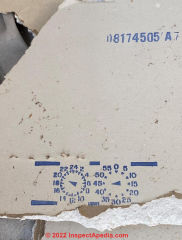 Trying to figure out meaning of stamps on the back of some drywall from my house. We found out a previous owner was aware of water and termite damage, but chose to cover it up and hide it instead of making proper repairs and likely did not disclose the issue when selling.
Trying to figure out meaning of stamps on the back of some drywall from my house. We found out a previous owner was aware of water and termite damage, but chose to cover it up and hide it instead of making proper repairs and likely did not disclose the issue when selling.
However, we aren't sure which previous owner it was. Hoping that a production date from some of the newer drywall will point us in the right direction.
What we think it newer drywall seems to have two types of stamp on each board. I will attach a picture of it. One stamp seems to be a production date code (maybe) and is just a string of characters (specifically 08174505 A7, but the last 7 is slightly faded).
The other stamp is what confuses me. It is two circular dials side by side, each with an arrow triangle pointing at a number like a clock. Not sure what it means and can't find any references to it online.
The first dial has 2 thru 24 (in sets of two) with the arrow seemingly pointing at 20, while the second dial has 0 through 55 (in sets of five) with the arrow seemingly pointing at 45.
Just not sure what to make of it. I'm attaching a picture of this newer looking drywall.
Some seemingly older sections of drywall merely have the stamp "0818482448" and then after a six to ten inch gap there is an "M"
Thanks for any help! - On 2022-02-28 by Seth
by Inspectapedia Com Moderator (mod) USG production date stamp: 0818482448"
@Seth,
My best guess is we're seeing production date and time stamps on your drywall.
The numeric string probably encodes a production date and a manufacturing plant ID but not the actual manufacturer.
Look for printed information on a paper tape found on the ends of the drywall.
Then check your guess at production date for the drywall by noting the age of the building where the drywall is installed as well as any remodeling or renovation dates.
by Seth - United States Gypsum patent numbers found
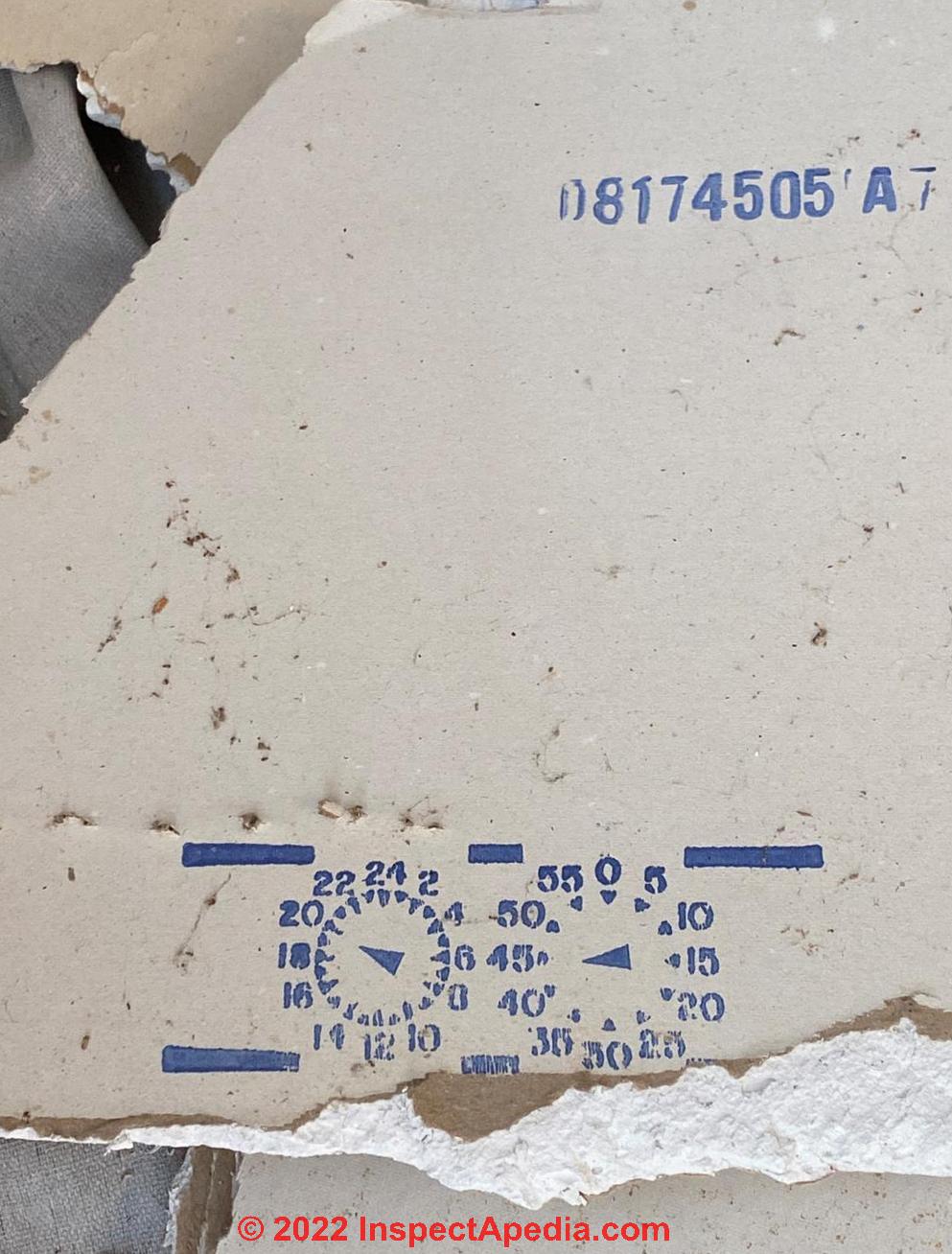 @Inspectapedia Com Moderator,
@Inspectapedia Com Moderator,
Production date is really all I need.
The manufacturer was United States Gypsum. US patents 3,380,042 and 3,431,143.
I just need to figure out production date to prove the approximate time the drywall was installed.
Comment by Inspectapedia Com Moderator (mod) - Patent Numbers give Floor under US Gypsum Drywall age
@Seth,
The patent numbers put a floor under the US Gypsum age.
US Patent 3,431,143 is
- Johnson, Gordon C., and Samuel Sterman. "Process for sizing paper with epoxy silicone and resulting products." U.S. Patent 3,431,143, issued March 4, 1969.
US Patent 3,380,042
is
- Townsend, Marjorie R., and Paul M. Feinberg. "Digital telemetry system." U.S. Patent 3,380,042, issued April 23, 1968.
If no patent numbers are found for years after those that you found, while the drywall could be newer, even from the '80's, it's reasonable to guess that your drywall age as late 1960's to the 1970s. My reasoning is that if it were newer we'd see more-recent patent numbers.
It would be helpful to have a sanity check on that guess: tell us the country and city of location of the building and the building's age or year of construction.
...
Drywall Gypsum Board Used for Exterior Wall Sheathing - Water Repellent
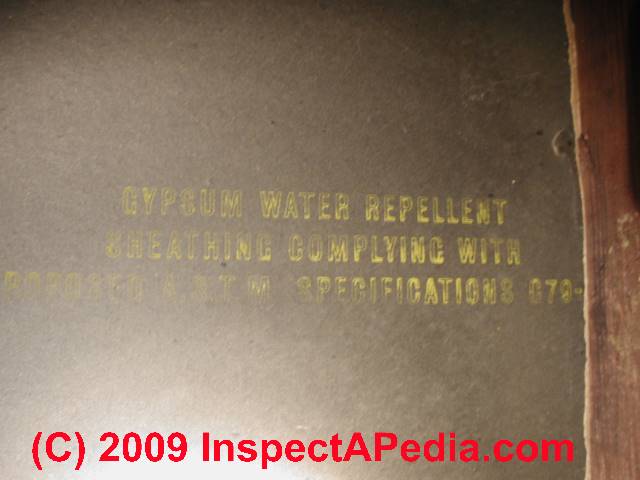
We estimate that from 1950 to 1965 gypsum board was used as exterior wall sheathing on a variety of buildings, especially low-cost structures and in panelized construction as we explain along with our photographs shown below.
We also find gypsum board sheathing used on some roofs, believe it or not.
In some applications a water repellent paper was used to improve the product's durability, as we show in this wall cavity side photograph of identifying marks on gypsum board sheathing.
Details: as water-resistant gypsum panels were widely used for exterior wall and roof sheathing we discuss this material separately
at GYPROC SHEATHING, GYPSUM BOARD
Also see DRYWALL MOLD RESISTANT for an interior drywall reported to resist mold growth.
...
Western Gypsum Products Ltd. - Canada
Western Gypsum Products Co. was founded in Winnipeg, Manitoba, in 1929. Western Gypsum produced Gypsum products from 1929 to 1963. The Western Gypsum brand is currently owned by US Gypsum who operate multiple gypsum product plants in the U.S. and Canada.
Notice that this 1960s Western Gypsum Products Logo is identical to the logo of the successor company Westroc described
at WESTROC DRYWALL / GYPSUM BOARD
and currently the WPC brand is owned by US Gypsum.
The Western Gypsum Products company headquarters was at 503 McArthur Bldg., Winnipeg, Manitoba, and the company's underground gypsum mine was at Amaranth with production facilities in Mayook, Winnipeg, and in Calgary Alberta (at least in 1949).
Westroc Industries Limited, the successor to Western Gypsum Products Limited, produced gypsum at the Silver Plains underground mine from 1964 to 1975, resulting from Western Gypsum Products Ltd. exporatory drilling that had been conducted there in the early 1960s. Production ceased at the Silver Plains gypsum mine after the mine flooded in 1975.
In the U.S. in 1948 Western Gypsum Products Ltd. began operating a gypsum processing plant in Sigurd, Utah where the company used gypsum from local gypsum mines in Sevier County where gypsum had been mined since 1908.
More details about the history of Western Gypsum Ltd. and the Western Gypsum Ltd. Gypsum Insulation shown above (courtesy of reader Cody) are
...
Westroc Canada Drywall / Gypsum Board Identification & Asbestos Content
The photos of Canadian Westroc drywall end tape text and markings and of the drywall back surface stamp shown here were provided courtesy of an InspectApedia.com reader (January, 2024).
- Original company address: Westroc Industries Ltd., 2650 Lakeshore Hwy, Mississauga, Ontario, L5J1K4
Canada
Canadian trademarks filed by Westroc included Westroc (cancelled) and Flextec. (inactive)
Westroc Canada gypsum board / drywall product names:
Shown here, Canadian Westroc Industries Ltd. Drywall - Gypsum Board Identification - end tapes & identification stamps, (C) InspectApedia.com J.K.
Westroc Wallboard, CSA Standard A 82.27-M 1977
- Westroc Fireboard Fire Rated Gypsum Board
- Westroc Gypsum Board, Gypsum Sheathing, Gypsum Cove Moulding, Laminated Gypsum Board, And Fibre Reinforced Gypsum Board
- Westroc Gypsumboard, Gypsum Sheathing, Moisture Resistant Board, Gypsum Cove Moulding, Laminated Gypsumboard, Fibre Reinforced Gypsumboard…
- Westroc Panaroc Filed: August 27, 1991 Cement Board For Use In Buildings
Above: the apparent date stamp of 1983 suggests that this Canadian Westroc drywall was manufactured before Canadian firms stopped using asbestos, so this product as well as drywall joint compound used in its installation both might contain asbestos. Lab test results are still needed.
Note that for drywall products dated 1990 or later you would not expect the product to contain asbestos.
- Westroc MareveliteFiled: August 8, 1990 drywall finishing products; namely, drywall joint tape and drywall edge trim
- Westroc Marvelite, Drywall Finishing Products, Namely Ready Mix Joint Cement, Powder Joint Cement, Powdered Textures, Ready Mix Textures, Corner Bead, Casings, Trims, Paper And Metal Beads, Drywall Screws, Perforated Joint Tape, Fibretape, Glitter, Masking Paper, Polyethylene, Hand Sanders, Pole Sanders, Drywall Tools, Compressor With Hose, Mastic Applicator, Corner Applicator, Pump, Flushers, Flusher Handle, Corner Rollers, Boxes, Box Handles, Taper, Outside Corner Rollers, Air Glitter Guns, Hand Glitter Guns, Texture Roller Refills, Texture Roller Kits, Texture Gun And Hopper, Pattern Pistol And Hopper, Foot Lifters, Mud Mixer Blades, Heavy Duty Caulking Gun, Adjustable Stilts, Wallboard Adhesive, Black Solvent Base, Contact Adhesive, Caulking
- Westroc Super Lite Filed: August 7, 1990 Joint Cement, Finishing Cements And Texture Cements
See more detail at ASBESTOS in CANADIAN DRYWALL
...
Gypsum Board / Drywall Identification Standards & Codes
- Source: Gypsum Association, IDENTIFICATION CODES on DRYWALL, USGA STANDARDS [PDF] (2017) Gypsum Association,
6525 Belcrest Road, #480
Hyattsville, MD 20782
USA, Tel: 301‐277‐8686
Website: www.gypsum.org - retrieved 2021/07/07 original source: American Gypsum Co https://www.americangypsum.com/sites/default/files/documents/GA-1000%20Identification%20of%20Gypsum%20Board.pdf
Excerpts:
Contemporary model building codes enforced throughout the United States and Canada require gypsum board to be manufactured to ASTM C1396 Standard Specification for Gypsum Board. Specification C1396 is referenced in the International Building Code, International Residential Code, NFPA 5000: Building Construction and Safety Code, and the national and provincial building codes in Canada.
By reference, ASTM C1396 mandates that gypsum board is to be marked in accordance with ASTM C1264, Standard Specification for Sampling, Inspection, Rejection, Certification, Packaging, Marking, Shipping, Handling, and Storage of Gypsum Panel Products.
Specification C1264 requires each panel or package of panelsto be legibly marked with specific information, including, but not limited to, the product thickness, the name of the producer orsupplier, and the ASTM product standard. The required information is most often printed on the bundling tape that binds two individual panels into a single shipping package.
In 2011, Specification C1264 was modified to require each individual sheet of gypsum board manufactured to comply with Specification C1396 to have the following information legibly printed on the back surface of each board, parallel to the bound edge of the board:
The name of the manufacturing company or a unique alpha code
identifying the name of the manufacturing company. The decision to print the name of the company or to create and use a unique code is at the discretion of the company.
A code identifying the manufacturing facility and, where applicable in a multi‐line facility, the production line.
A code identifying the date and time of manufacture.
The country of manufacture as designated by the three letter code in ISO 3166‐1.
The information does not have to be printed along both bound edges ofthe board. The printing may incorporate any legible size character orfont. Additional information may be added at the discretion of the manufacturer.
Gypsum Association Members 2017: American Gypsum Company LLC, Certainteed Gypsum, Inc. / Certainteed Gypsum Canada, Inc,. Continental Building Products Operating Company, LLC, Georgia–Pacific Gypsum LLC, National Gypsum Company, Pabco® Gypsum, United States Gypsum Company / Cgc Inc. - U.S. ASTM, ASTM C1396/C1396M-17
Standard Specification for Gypsum Board, ASTM, https://www.astm.org/c1396_c1396m-17.html
Abstract:
This specification covers gypsum boards which include the following: gypsum wallboard for use on walls, ceilings, or partitions and that affords a surface suitable to receive decoration; predecorated gypsum board for use as the finished surfacing for walls, ceilings, or partitions;
gypsum backing board, coreboard, and shaftliner board for use as a base in multilayer systems or as a gypsum stud or core in semisolid or solid gypsum board partitions, or in shaft wall assemblies; water-resistant gypsum backing board to be used as a base for the application of ceramic or plastic tile on walls or ceilings; exterior gypsum soffit board for exterior soffits and carport ceilings that are completely protected from contact with liquid water;
gypsum sheathing board for use as sheathing on buildings; gypsum base for veneer plaster; gypsum lath for use as a base for gypsum plaster application; and gypsum ceiling board for interior ceilings and walls.
Gypsum board shall consist of a noncombustible core, essentially gypsum, surfaced with paper bonded to the core.
The specimens shall comply with the following required physical properties: core, end, and edge hardness; straightness of the edges and ends; length; tapered edge depth; flexural strength; humidified deflection; nail pull resistance; permeance; water resistance; and surface water absorption. - U.S. CPSC, NOTICE of INQUIRY, IDENTIFYING LABELS FOR DRYWALL UNDER SECTION 14(C) OF THE CONSUMER PRODUCT SAFETY ACT; NOTICE OF INQUIRY; REQUEST FOR COMMENTS AND INFORMATION [PDF] (2009)
Excerpt:
SUMMARY: Section 14(c) of the Consumer Product Safety Act authorizes the Consumer Product Safety Commission (‘‘Commission’’ or ‘‘CPSC’’) to require, through rulemaking, labels for a consumer product that would identify the date and place of manufacture of the product, cohort information (batch, run number, or other identifying characteristic), and the manufacturer of the product. 15 U.S.C. 2063(c). This notice requests comments and information about such a rulemaking with regard to drywall.
- U.S. CPSC, NOTICE of INQUIRY: IDENITFYING LABELS for DRYWALL [PDF] U.S. Consumer Product Safety Commission, 24 November 2009, retrieved 2021/07/07 original source: https://www.cpsc.gov/s3fs-public/pdfs/foia_drywalllabels.pdf
Focused on identifying Chinese-made drywall as discussed
at CHINESE DRYWALL HAZARDS - USG US GYPSUM MANUFACTURING LOCATIONS [PDF] US Gypsum, retrieved 2021/07/07 original source: https://www.usg.com/content/usgcom/en/about-usg/worldwide-locations/manufacturing-locations.html
This document lists USG facilities around the world and identifies what products are made, but does not include plant codes.
...
Identify Decode Older or Non-Conforming Drywall Stamps
If using the 2017-and-later drywall date stamp decoder found
at DRYWALL TYPE IDENTIFICATION STAMPS
does not give sensible results then here are more drywall ID stamp decoding tools:
- DRWALL MANUFACTURER COUNTRY CODES
- DRYWALL PRODUCT CODES & DATE CODES
- DRYWALL STAMP DECODING by CONTEXTUAL CLUES
- DRYWALL MANUFACTURER IDENTIFICATION STAMPS & DATE CODES - alphabetical list - You are on this page
- DIFFERENCES Among DRYWALL Type C & Type X Drywall & Type X Shaftliner Drywall
- GYPSUM BOARD PLASTER LATH SYSTEMS [separate article] solid & perforated gypsum board used under plaster
For contemporary guides to currently-sold gypsum board types and identification codes see
GYPSUM PANEL PRODUCTS TYPES, USES, SIZES, AND STANDARDS [PDF] (2022) US Gypsum Association, 6525 Belcrest Road, Ste 480 Hyattsville, MD 20782 USA, Tel: 301-277-8686 Web: www.gypsum.org - retrieved 2022/09/13, original source: https://www.gypsum.org/wp-content/uploads/2011/11/223-04.pdf
For the older standard see
GYPSUM PANEL PRODUCTS TYPES, USES, SIZES, AND STANDARDS [PDF] (2017) USGA, Op. Cit., - retrieved 2022/09/13,original source https://www.americangypsum.com/sites/default/files/2022-01/ga-223_gypsum_panel_products_types_uses_sizes_and_standards.pdf
...
...
Continue reading at DRYWALL TYPE IDENTIFICATION STAMPS or select a topic from the closely-related articles below, or see the complete ARTICLE INDEX.
Or see DRYWALL MANUFACTURER IDENTIFICATION STAMPS & DATE CODE FAQs, diagnostic questions & answers posted originally at this page.
Or see these
Recommended Articles
- ASBESTOS in DRYWALL
- DRYWALL, FIBERBOARD, PLASTER INTERIORS - home
- DRYWALL TYPE IDENTIFICATION STAMPS
- DRYWALL MANUFACTURER COUNTRY CODES
- DRYWALL MOLD RESISTANT
- DRYWALL PRODUCT CODES & DATE CODES
- DRYWALL STAMP DECODING by CONTEXTUAL CLUES
- EXTERIOR-USE GYPSUM BOARD
- DIFFERENCES Among DRYWALL Type C & Type X Drywall & Type X Shaftliner Drywall
- GYPSUM BOARD GYP ROCK SHEATHING
- GYPSUM BOARD PLASTER LATH SYSTEMS - solid & perforated gypsum board used under plaster
- ROCK LATH GYP LATH PLASTER BASE
- SHEETROCK® TYPE X FIRE RESISTANT USG Drywall
- TYPE C DRYWALL vs Type X DRYWALL
- UL UNDERWRITERS LABORATORY STAMP on DRYWALL
- DRYWALL & GYPSUM BOARD COMPOSITION & HISTORY - composition of drywall & drywall history
- DRYWALL MANUFACTURER IDENTIFICATION STAMPS & DATE CODES
- DRYWALL TYPE IDENTIFICATION STAMPS
- GYPSUM BOARD GYP ROCK SHEATHING
- GYPSUM BOARD PLASTER LATH SYSTEMS
- PLASTER TYPES & METHODS in BUILDINGS
Suggested citation for this web page
DRYWALL MANUFACTURER IDENTIFICATION STAMPS & DATE CODES at InspectApedia.com - online encyclopedia of building & environmental inspection, testing, diagnosis, repair, & problem prevention advice.
Or see this../interiors/Drywall-Manufacturer-Identification-Stamps.php#AmericanGypsum
INDEX to RELATED ARTICLES: ARTICLE INDEX to BUILDING INTERIORS
Or use the SEARCH BOX found below to Ask a Question or Search InspectApedia
Ask a Question or Search InspectApedia
Questions & answers or comments about ages & types of wall & ceiling materials, installations & practices.
Try the search box just below, or if you prefer, post a question or comment in the Comments box below and we will respond promptly.
Search the InspectApedia website
Note: appearance of your Comment below may be delayed: if your comment contains an image, photograph, web link, or text that looks to the software as if it might be a web link, your posting will appear after it has been approved by a moderator. Apologies for the delay.
Only one image can be added per comment but you can post as many comments, and therefore images, as you like.
You will not receive a notification when a response to your question has been posted.
Please bookmark this page to make it easy for you to check back for our response.
IF above you see "Comment Form is loading comments..." then COMMENT BOX - countable.ca / bawkbox.com IS NOT WORKING.
In any case you are welcome to send an email directly to us at InspectApedia.com at editor@inspectApedia.com
We'll reply to you directly. Please help us help you by noting, in your email, the URL of the InspectApedia page where you wanted to comment.
Citations & References
In addition to any citations in the article above, a full list is available on request.
- America's Favorite Homes, mail-order catalogues as a guide to popular early 20th-century houses, Robert Schweitzer, Michael W.R. Davis, 1990, Wayne State University Press ISBN 0814320066 (may be available from Wayne State University Press)
- In addition to citations & references found in this article, see the research citations given at the end of the related articles found at our suggested
CONTINUE READING or RECOMMENDED ARTICLES.
- Carson, Dunlop & Associates Ltd., 120 Carlton Street Suite 407, Toronto ON M5A 4K2. Tel: (416) 964-9415 1-800-268-7070 Email: info@carsondunlop.com. Alan Carson is a past president of ASHI, the American Society of Home Inspectors.
Thanks to Alan Carson and Bob Dunlop, for permission for InspectAPedia to use text excerpts from The HOME REFERENCE BOOK - the Encyclopedia of Homes and to use illustrations from The ILLUSTRATED HOME .
Carson Dunlop Associates provides extensive home inspection education and report writing material. In gratitude we provide links to tsome Carson Dunlop Associates products and services.


